#he then proceeded to divorce and arrest his former wife
Text
the historical comparison games with henry viii are so taxing....i hate twitter, lmfao
#i am not going defend any of the heinous and hell-deserving things he did but i am really not about pretending like comparatively his#successors and predecessors were morally superior ; or at least not by very much?#and YES even if we limit it to queens/kings of england#for fuck's sake; george i of england ordered the murder of his wife's lover#and was drowned with heavy stones#he then proceeded to divorce and arrest his former wife#she was never again allowed to see any of her children#and imprisoned her for the rest of her life#if life imprisonment is much better than judicial murder like...idt it is by very much?#and permanent child separation#even if the prisons are estates rather than cells. like. especially when we are talking about 30+ years#and i think this about juana of castile too#also the sons of francis i WERE actually kept in dank cells by charles v .#and they were CHILDREN??
2 notes
·
View notes
Text
Fired CNN producer John Griffin accused of molesting a child during "sexual training" is seeking to resolve his federal criminal case with a plea deal before the end of the year, court documents indicate.
Griffin's attorney has requested a two-month stay on the federal charges so they could discuss a plea arrangement, according to documents filed in the case this week. Federal prosecutors have agreed to the stay, Griffin's attorney David Kirby wrote in the court filings.
Griffin, a former Connecticut resident who lived in Stamford and Norwalk, is accused by federal authorities of trying to lure women and their daughters to his Vermont ski home for “sexual training.” In one case, a Nevada woman flew to Boston where Griffin picked them up and brought them to his Vermont house, court documents said.
The adoptive mother was arrested and sentenced to eight to 20 years in prison in Nevada in connection with the incident. The child and her guardian, who are living in Connecticut, claim in a lawsuit filed in January against Griffin that the girl was forced to commit sex acts while she was at the Vermont home. The child was 9 when the incidents allegedly occurred in July 2020, court documents in the lawsuit said.
The attorney for the child is now contending his client was the victim of sex trafficking, according to court documents filed last week.
Kirby said in court documents filed in June that Griffin had been offered a plea deal but talks would be stalled during the summer months. In a motion filed Tuesday, Kirby contends he will not file any motions in the next two months so talks can continue to resolve the case with a plea agreement.
Kirby wants a judge to stop the clock on speedy trial proceedings until Nov. 20 to allow the plea negotiations to proceed, the motion stated.
"The defendant is presently in custody, serving time that will be counted toward whatever sentence he will receive," Kirby wrote in the document. "The running of the speedy-trial clock is putting undue pressure on the parties to resolve the matter, making it difficult to achieve a thoughtful resolution."
The lawsuit has been on hold until the criminal proceedings are finished. Griffin was required to sell the Vermont ski house and give his half of the proceeds — $1 million — to the federal court so he will have the funds to pay any fines or restitution as part of his sentence, court documents show.
Griffin, a former CNN producer for Chris Cuomo and others, was charged by federal authorities last December with three counts of using a facility of interstate commerce to attempt to entice minors to engage in unlawful sexual activity.
The 10-page indictment issued by a Grand Jury alleges that Griffin frequently used Kik, a messaging application, and Google Hangouts to lure women with young daughters to meet him at the Vermont ski house he had bought with his wife to provide “sexual training” on how to be “submissive” to men. Griffin boasted in web chats that he had trained girls as young as 7 years old, federal authorities said.
His wife, who filed for divorce weeks after he was taken into custody, was not implicated in the scheme, officials said.
36 notes
·
View notes
Text
Sora Backstory
Orla Byrne and Nakamura Katsuyaka met in an American high-school. Both away from their home countries, they felt like fish out of water, and they both faced a lot of discrimination. But, they didn’t let it bother them. High-school sweethearts, even as Katsuyaka returned to Japan and Orla entered the army, they contacted each other. When Orla returned and they continued properly dating, Katsuyaka proposed.
After two years of being married, the couple were expecting their first child—Sora. When Sora was four, Nariha was born.
Everything was going well. The family was happy and communicated their problems well. Sora protected Nariha, who was a sickly girl, with everything she had, and her parents admired her.
Then Katsuyaka was arrested. Sora was seven at the time, Nariha three. He was detained for drug possession, which in Japan is punishable to up to twenty years in prison. Orla was heartbroken. Katsuyaka was a respected and model man, a golden retriever, written by a woman type of guy, so she had a difficult time believing this.
Orla spoke to her mother about the situation. She suggested that Orla take the kids to her hometown, Westport/Adare/Ballyvaughan. She would feel better at home surrounded by her family, and her kids deserved to know about their Irish blood as well.
Sora, however, was upset by this. She didn’t want to leave her father. They could call each other on visiting days, but it wasn’t the same as having him standing in front of her. As she aged, this anger only grew.
While in Ireland, Orla met a man named Teagan. They got along and started dating. Teagan knew about the family’s situation, and he was sympathetic. Soon, though, he wanted to marry Orla, and her feeling the same way, it was back to Japan with a divorce lawyer. Katsuyaka was forced to sign the documents. Being in prison he didn’t have the power to negotiate terms, and thus he relinquished possession of his children (he wouldn’t be out for a long time anyways, so it would matter). Sora and Liam were brought along but they didn’t get to see their father. Sora yelled at her mum, who proceeded to threaten her with a wooden spoon. Still young, Sora quieted down, but she was enraged.
Back to Ireland this time, Orla and Teagan got married. Teagan and his daughter Deirdre moved into Sora’s house.
Deirdre was kind, and she got along well with Nariha. However, Sora was reluctant to get to know her.
As Sora got older, she grew to hate her stepfather. He was controlling and didn’t allow her basic privacy, claiming she might be doing drugs and talking to boys. Sora told her mother, the former lieutenant corporal, in hopes it would do something, but Orla let her down. She told Teagan off for taking Sora’s door, but when she reinstalled it, she made Sora keep it open.
It was always like this. Teagan would get upset by the smallest things, and Sora would ignore him. She stopped going to her mother after that.
Sora was the embodiment of a rebellious teenager. She snuck out in the day and night, sometimes not returning home for a few days at a time. She spent time with her best friend, Tierney, and others that she didn’t trust but hung out with anyway.
One day, Sora returned home after almost a week away, ignoring her family’s texts and calls. Teagan was furious. He yelled at Sora for an explanation, but she brushed him off. He got angrier and hit her, giving her a blood nose. Orla told him to leave the house, so he went to a pub. Orla tried to help Sora, but she pushed her away and ran into her room, slamming the door shut.
Orla got drunk and passed out. Nariha convinced Sora to let her clean her up. Deirdre apologised for her father, saying that sometimes she wanted to go against what he said, but that would upset him. After his wife, Deirdre’s mother, died, he was different.
Teagan left Sora alone from there. He didn’t try to bond with her, and instead he focused on fixing his and Orla’s relationship.
When she graduated high school, Sora announced to her family that she had been accepted into a university in Japan renowned for its medical courses. Another few months in Ireland and Sora was off about a month before the school year started. She settled in, meeting a couple of people at a kickboxing gym and her apartment building.
Sora took a course in medicine and general surgery, plus theoretical astrophysics for fun. Here she met Sasuke. Sora was still in uni, working part time at a hospital, when Sasuke became a post grad student. Despite this, they still hung out, and the two became best friends. She only spoke to Nariha, Deirdre, and occasionally her mother from there (over the phone).
Sora went to see her father when he got out of prison, but he was different. He had been trying to build up his life from what was left of it, and it was not going well, old debts chasing him around. While Sora was overjoyed to see him again, Katsuyaka barely noticed her. Sora was disappointed. She tried to call and text him, but she rarely got a response. Eventually she stopped trying.
As if things couldn’t get worse in Sora’s life, she found out her girlfriend of four years who she met in Japan was cheating on her. In a way she had known for the year it had been happening, but she refused to acknowledge it. She had confided in her ex-girlfriend about her family and all the other issues in her life. It hurt.
#she has trust issues now#and problems with emotional intimacy#cybird ikemen series#cybird ikemen#ikemen series#ikemen sengoku#ikesen#ikemen oc#cybird#ikesen oc#ikemen sengoku oc#sora byrne nakamura
0 notes
Text
[ad_1]
Hollywood producer Eric Weinberg was taken into custody by Los Angeles police on Tuesday after prosecutors filed 18 sexual abuse and assault expenses in opposition to him.The former “Scrubs” co-executive producer was arrested by intercourse crimes detectives after the Los Angeles County district legal professional filed expenses of rape, oral copulation, sexual battery, false imprisonment, assault by means to trigger nice bodily hurt, and 6 counts of forcible penetration by a overseas object, courtroom data present. Weinberg was being held in lieu of $5 million bail as of Tuesday night.More than half a dozen ladies have made allegations over the past seven years that Weinberg lured them to his dwelling, usually below the guise of a photograph shoot, earlier than restraining and sexually assaulting them, police interviews and records obtained by The Times in July confirmed.Los Angeles Police Department intercourse crime investigators beforehand arrested him on July 14 in connection with multiple sexual assaults, together with rape, between 2012 and 2019. LAPD Capt. Kelly Muniz instructed The Times the division had recognized at the very least eight ladies Weinberg could have victimized. The dates akin to the brand new expenses weren't accessible Tuesday night.Micha Star Liberty, a Bay Area civil rights legal professional who's representing a number of the ladies accusing Weinberg of abuse, mentioned in an announcement that she was “grateful that the District Attorney has acted in furtherance of accountability.”“The significant number of victims and the horrific impact inflicted upon those women will not go unremediated,” she mentioned. “We will not rest until there is justice.” According to police and civil courtroom data, Weinberg lured ladies from espresso bars, supermarkets and a Los Feliz pie store to his Edgemont Street dwelling.After one encounter, a lady started utilizing a Facebook group to warn about Weinberg’s alleged habits, in response to a declaration filed in household courtroom. At least twice earlier than his arrest on July 14, Weinberg had been investigated by the LAPD on suspicion of sexual assault, reserving data and statements from the LAPD present.During divorce and little one custody proceedings in October 2020, testimony from three ladies who mentioned he sexually assaulted them throughout picture periods was offered. His then-wife’s lawyer alleged Weinberg additionally tried to choose up a teenage woman who attended their son’s highschool and the woman turned out to know his son, in response to a 2020 little one custody submitting in L.A. County household legislation courtroom.Weinberg couldn't be reached by The Times for remark. But his legal professional within the little one custody case denied any wrongdoing on his half, calling the ladies’s declarations a “blatant smear campaign” with “unconscionable and unsubstantiated allegations” which can be designed to painting him within the “most horrendous light.”Detectives have mentioned Weinberg would method ladies of their 20s and 30s and arrange picture shoots with them. Sometimes he talked about his profession in Hollywood. Weinberg labored on 92 episodes of “Scrubs” from 2001 to 2007 and wrote a few of them. He additionally served as a producer on “Veronica’s Closet,” “Californication” and “Anger Management,” in addition to “Men at Work,” which starred Danny Masterson, who has additionally been charged with sexual abuse of a number of ladies.The LAPD beforehand offered two rape investigations in opposition to Weinberg to the Los Angeles County district legal professional’s workplace, which declined to prosecute Weinberg for incidents in April and August 2014, citing a scarcity of ample proof, in response to a declination from the workplace and statements from the LAPD.“It wasn’t until detectives received a recent late-reported rape that they opened another investigation into Weinberg,” LAPD officers mentioned in an announcement to The Times.
“It was ... this new reported crime that led detectives to the additional victims being identified.” Detectives have since offered a number of new circumstances, that are below evaluation with the district legal professional’s workplace, authorities mentioned.“The investigation is in the early stages and not complete; however, eight victims have been identified,” police mentioned, including that investigators are working by way of ideas and anticipate extra circumstances. According to an LAPD assertion, detectives knew a Facebook group was created after the preliminary circumstances in opposition to Weinberg have been rejected, and investigators are trying into social media posts to determine different doable victims.Documents filed in a household legislation case between Weinberg and his ex-wife present allegations from three ladies of sexually violent encounters with him from 2014 to 2019. The dates in these incidents don't correspond with different allegations beforehand declined by prosecutors. The Times doesn't determine victims of sexual assault with out their consent. One younger girl alleged that she was 22 when she met him at a espresso store, Republic of Pie, in North Hollywood.“Eric raped and physically assaulted me in 2014 after convincing me to come to his home for a photo shoot,” she mentioned in a 2020 declaration filed in a household legislation case involving Weinberg. The girl mentioned Weinberg appeared skilled, exhibiting her the images he had shot of different ladies and telling her he was a father of three. On April 29, 2014, they met at his dwelling, she mentioned. She agreed to undress right down to her bra and underwear, and Weinberg instructed the girl she wanted to use lotion “because it was good for the lighting,” courtroom data present. “While Eric was putting lotion on my back‚ he began to take off my underwear.... I never told Eric he could undress me, and I did not consent to him putting his tongue on me,” the girl mentioned in a courtroom declaration. “I did not know what was happening and was terrified. I did not know how I was going to get away from him. I completely froze up.” She mentioned he continued to take pictures as he pinned her to the mattress and compelled her to carry out oral intercourse. He then choked her “and squeezed so hard that I thought I was going to pass out,” after which he raped her, she alleged within the declaration. Afterward, she mentioned, he loaded the images onto a flash drive and gave it to her.In one other sworn declaration, a 31-year-old North Hollywood storyboard artist mentioned she met Weinberg at a Ralphs in February 2019. He requested if she modeled and whether or not her breasts have been pure, she mentioned, then supplied to take pictures of her after telling her about his household and his work on “Scrubs.”She mentioned when she got here to his dwelling, the picture shoot started in what gave the impression to be a woman’s bed room. At first, he was skilled, however because the bare mannequin and the photographer moved to different places, issues took a sexually violent flip, in response to courtroom paperwork. Nearly a 12 months later, courtroom data present, a 30-year-old girl met Weinberg on OK Cupid and went for a glass of wine with him earlier than going to his dwelling to take heed to music, in response to the girl’s declaration filed in a household courtroom case involving Weinberg. After kissing in the lounge, they went to the bed room and commenced to take away their garments consensually, however then he turned aggressive, forcing her to carry out sexual acts whereas he restrained her, the girl mentioned within the declaration. In the aftermath, she mentioned in courtroom paperwork, “he spent the hour trying to convince me that I had ‘misremembered’ ... [but] I knew I did not consent.”
[ad_2]
Source link
0 notes
Photo


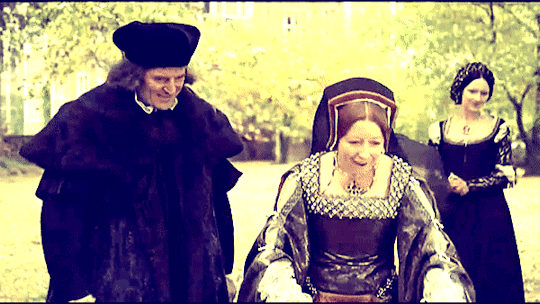
JUAN LUIS VIVES AND CATHERINE OF ARAGON
Juan Luis Vives was a Spanish humanist born in Valencia, the capital of one of the patrimonial states of the Crown of Aragon. He came from a family that had been persecuted by the Inquisition and which may have practised crypto-Judaism. Vives, who had attended the city’s newly founded university, left Spain in 1509. He did not return. He settled first in Paris and continued his studies with scholastic logic, but five years later he moved to Bruges, where he remained until 1516. It was at the court of Brussels that he met Erasmus for the first time and where the ensuing deep and enduring friendship, which became such a central feature in Vives’s life, began. Vives had taken up a position as tutor to Guillaume de Croy, bishop of Cambrai. Vives lived in Louvain, teaching at the Collegium Trilingue, until Croy’s death. By 1521 Vives was already benefitting from a small pension from Queen Catherine of Aragon, Charles V's aunt. At the insistence of his friend Erasmus, Vives prepared an elaborate commentary on Augustine's De Civitate Dei, which was published in 1522 with a dedication to Henry VIII of England.

Apparently impressed, Henry VIII invited him to come to England in 1523 and make it his “scholarly home”. Vives went on to become a popular lecturer at Oxford, “where the King and Queen went to hear him.” When it came time to decide how Princess Mary should be educated, it was Juan Luis Vives to whom Catherine turned for help in designing a course of study. Later she would also seek the aid of Erasmus. Others humanist scholars also contributed to Mary’s education in various ways. Catherine of Aragon commissioned Vives to write De Institutione Feminae Christianae in 1523, shortly before his arrival in England. A book he dedicated to the English queen.
Moved by the holiness of your life and your ardent zeal for sacred studies, I have endeavoured to write something for your Majesty on the education of the Christian Woman … your daughter Mary will read these recommendations and will reproduce them as she models herself on the example of your goodness and wisdom to be found within your home. She will do this assuredly, and unless she alone belies all human expectations, must of necessity be virtuous and holy as the offspring of you and Henry VIII, such a noble and honoured pair.

Queen Catherine produced money for a translation of The Education of a Christian Woman from Latin into English. The English version was reprinted eight times during the sixteenth century. Once Catherine took up the theory of female education, she did not limit herself to its reference to her daughter. She began to form around Mary a school for the daughters of noblemen, on the pattern of that for noblemen’s sons once formed around her brother Juan, and she even persuaded a number of the older ladies of the court, notably her sister-in-law, the Duchess of Suffolk, to resume the study of Latin and take up a course of serious reading. She turned over a copy of Vives’s treatise to Thomas More, whose own daughters were probably the best educated young women of their class in England, and urged him to translate it into English, or to get it translated, so that its ideas might be available to everybody who could take advantage of them.

For the next five years, Vives spent some part of every year in England, lecturing eloquently at Oxford, spending much time at court, and writing joyously on such a variety of subjects that Thomas More professed himself quite abashed before the performance of the younger man. In October 1524, Catherine commissioned Luis Vives to write a more specifc curriculum of study for her seven-year-old daughter. The resulting De Ratione Studii Puerilis (On a Plan of Study for Children) was dedicated to the young princess herself. As Mary got older, Vives advised that Catherine revise her educational program more precisely: “Time will admonish her as to more exact details, and thy singular wisdom will discover for her what they should be.”
Additionally, Vives also often accompanied the Queen to the abbey at Syon on the west side of London of the river Thames. Syon Abbey was renowned as a place of spiritual learning and a regular meeting place of scholars, much favored by the pious Queen. Catherine found in Vives a prudent adviser, a brilliant teacher, a personal friend, and the ideal partner in long, nostalgic, confidential and spirited conversations in their native language. One of those conversations impressed Vives in some particular, mysterious way. From Oxford , on January 25, 1524, Vives wrote to Cranevelt:
At times I was able to have some philosophical talks with the Queen, one of the purest and most Christian souls I have ever seen. Thus, a couple of days ago, on our way by barge to a certain monastery of nuns, we came to talk about adversity and prosperity in this life. The Queen said: “If I could chose between the two, I would prefer an equal share of both, neither complete adversity nor total success. And If I had to choose between extreme sorrow and extreme well-being, I think I would prefer the former to the latter, for people in disgrace need only some consolation while those who are too successful frequently lose their minds.”

In 1528 he forfeited Henry’s favour by opposing the royal divorce from Catherine of Aragon, assisting her with spoken and written advice. The king retaliated by placing Vives and a servant of Catherine under house arrest for six weeks. Both men were interrogated by Wolsey, and Vives was ordered to state his communication with the queen: after a lengthy, idealistic preamble on the sacredness of confidences between individuals, he reluctantly complied. The object of the confinement was to keep Catherine’s advisers away from court, and both she and Vives judged it prudent that he leave the country on his release. Vives returned to Bruges.
He returned to England late in 1528 with two Flemish jurists sent at Catherine’s request from her sister-in-law, Margaret of Austria. However, Vives found himself unpopular with the queen as well as the king: he offered the unpalatable advice that, since it was useless to defend her in the court at Blackfriars, it would be better if she were condemned unheard, since Henry would have difficulty justifying this. Catherine, though ultimately adopting this policy, interpreted his answer as a treacherous refusal to commit himself to her cause. As the king had done, she too stopped the pension she had granted him, and Vives left England for ever. He continued, however, to follow the proceedings, and he gave Catherine a generous encomium in his book named De Oflcio Mariti published in 1529. In the chapter dedicated to choosing a wife he referred to Queen Catherine on the following manner:
“Not in all women all imperfections are present, and in those who have them are not present to the same degree. There were in fact, and there are not in little number, some with a stronger and manlier heart than many men. Abundant amongst the gentile: Cleobulina, Hipparchia, Diotima, Lucretia, Cornelia, Porcia, Cloelia, Sulpicia. But also amongst our martyrs are many women that have bigger eloquence that Athena and more courage than Rome. And Christ wanted that in our time there was an example that will expand through posterity: the example of Catherine of Spain, Queen of England, wife of Henry VIII, about her you can say with greater truth that Valerius said about Lucretia: by an error of Nature, a woman’s body was grace with a male spirit”.
Sources:
María Dowling, Humanist Support for Katherine of Aragon
Garrett Mattingly, Catherine of Aragon
Carlos O. Noreña, Juan Luis Vives
Anna Whitelock, Mary Tudor: Princess, Bastard, Queen
Charles Fantazzi, A Companion to Juan Luis Vives
Leanne Croon Hickman, Katherine of Aragon: A “Pioneer of Women’s Education”? Humanism and Women’s Education in Early Sixteenth Century England.
Giles Tremlett, CATHERINE OF ARAGON Henry’s Spanish Queen
http://emlo-portal.bodleian.ox.ac.uk/collections/?catalogue=juan-luis-vives
#Juan Luis Vives#Catherine of Aragon#Katherine of Aragon#Catalina de Aragón#Luis Vives#Mary Tudor#Mary I of England#Henry VIII#British history#Men in history#women in history
73 notes
·
View notes
Text
Third Reich Biographies: SS-Hauptsturmfuhrer Waldemar Hoven (Part 3)

Caption: Waldemar Hoven at Landsberg Prison in 1948 shortly before being hanged. (Photo Credits: WW2 Gravestone)
(Cont. from part 2)
During the Nuremberg Doctor’s Trial in 1946 to 1947, Hoven was arrested and sentenced to death by the presiding American tribunal court for crimes against humanity, namely his involvement in the typhus experiments which had taken place in KZ Buchenwald, war crimes, and membership in an organization declared criminal. According to the official summary by the American tribunal by which Hoven was tried, “when the defendant Hoven took the stand in his own defense, he attempted to discredit the effects of the statements contained in his affidavit by testifying that it was taken as a result of interrogations propounded to him by the prosecution in English, and that he was not sufficiently familiar with the language...the Tribunal is not impressed with these assertions...prior to the war the defendant had lived for several years in the United States, where he had acquired at least an average understanding and comprehension of the English language....the Tribunal is convinced that...Hoven knew and understood perfectly well...the statements he was making.”
However, some former prisoners of the camp spoke in his favor, and a petition for clemency was even put forward by the Archbishop of his hometown in Freiburg.
Hoven’s wife Emmy, who had in the meantime gotten a divorce from him and had married a machine tool dealer by the name of Georg Noll, tried along with her current husband to persuade the state president of Baden to petition for clemency. Although he was inclined to do so, the remainder of the state government as well as the state attorney refused to do so. Hoven later wrote Noll a letter of thanks from Landsberg prison, thanking him for his efforts. In the letter, Hoven described himself as the “betrayed savior of Buchenwald”, stating that it was due to his efforts that Buchenwald was considered to be “an oasis” when compared with other concentration camps, and that if he partook in any sort of corruption, it was because he had the best interests of the prisoners in mind, and used the proceedings to help as many as he could.
Waldemar Hoven was hanged in Landsberg prison on June 2nd, 1948. He was buried in the Spottinger Friedhof (Cemetery) in Landsberg. By the year 2018, according to the book “ Die Strafanstalt Landsberg am Lech” by Thomas Raithel, Hoven’s remains had been removed from the Landsberg cemetery and reinterred in Freiburg, perhaps at the initiative of the members of his family.
Benedikt Kautsky wrote in his book “Teufel und Verdammte”, published in 1946: “To be honest, I never really understood him. On the one hand, he unhesitatingly went along with all the injections, experiments with typhus, etc., to which thousands of prisoners fell victim; on the other hand, he openly allied himself with the political prisoners who dominated the camp, campaigned for medical and hygienic improvements in the camp, took care of mistreated prisoners, and played a decisive role in the camp's internal politics. In the struggle among the prisoner groups, he was clearly on the side of the political ones and helped them in the fight against the criminals wherever he could. He went so far as to act as an enforcer of summary judgments against criminals. Many an informer and zincer, many a torturer and racketeer who had plied his trade at the expense of his fellow prisoners died at his hands, or at least with his help.”
Sources:
1- Tater, Helfer, Trittbrettfahrer by Wolfgang Proske
2- Wikipedia EN/DE, Waldemar Hoven
3- FindAGrave: Dr. Waldemar Hoven (1903-1948)
4- Trials of War Criminals Before the Nuremberg Military Tribunals Under Control Council Law No. 10, Nuernberg, October 1946-April 1949 Volume 2
2 notes
·
View notes
Text
Richard “The Iceman” Kuklinski
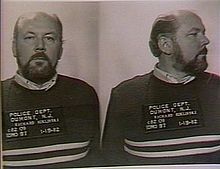
This week’s post is about my favorite hitman/serial killer to read about. This man scares me more than any other monster I have researched because I find something comforting and familiar about the way he looks and the sound of his voice. His story actually scares me so much that it’s taken me a couple days to write this post even though I’ve already done the research because it triggers my anxiety, specifically writing about his family life. Hope you guys enjoy, feel free to send me any feedback or requests.
TRIGGER WARNING: mentions of child abuse, death of a child, animal abuse and death, murder and domestic abuse
Richard Leonard Kuklinski, also known as “The Iceman” was born on April 11, 1935 in Jersey City, New Jersey. It seems as though he never had a chance to be a child. His father, Stanley Kuklinski, was a very abusive alcoholic and beat him and his siblings daily. When Kuklinski was six years old, his father beat his older brother, Florian, to death while intoxicated. After this, Stanley abandoned his family. Unfortunately, Kuklinski’s life did not get any better with his fathers absence. His mother, Anna Kuklinski, believed her children should grow up in a strict household so she hit him routinely. Kuklinski even claimed his mother broke a broomstick over his back. On top of the abuse he suffered at home, he was a target for bullies thanks to his small size. This all made Kuklinski a very angry person. In order to cope with that anger and give himself a sense of power, he would mutilate cats and dogs.
When Kuklinski was thirteen, he set out to get revenge on the leader of a small neighborhood gang that had been bullying him. He beat the boy to death with a wooden dowel then, to prevent authorities from identifying the body, he cut off his fingers with a hatchet and pulled out his teeth with pliers. Kuklinski claimed he hadn’t planned on killing the boy but proceeded to seek out the rest of the members and beat them almost to death with an iron rod.
As time went on, Kuklinski became a well-known pool shark who was heavily feared because of his short fuse. He claimed to have killed anyone who he felt rubbed him the wrong way, but had one rule. He would not kill women or children. Unlike most serial killers, Kuklinski did not abuse drugs or alcohol and he did not kill out of lust. He only killed out of anger and later on, for money.
It seems as though Kuklinski was as transparent as can be right? Except he wasn’t. His crimes were kept a secret from his family. His own wife had no idea what he did for a living, though by the time he met her, he was already an experienced killer. When Kuklinski was twenty-five, even though he was already married and had a little boy, he met and fell in love with the eighteen-year-old secretary, Barbara Pedrici, at the trucking company he was working for at the time. Barbara said Kuklinski was charming and always told her he loved her. As their relationship got more serious, Barbara grew worried that she was becoming isolated from her family and friends. She decided to try and end their relationship. When she brought this up to Kuklinski, he took a hunting knife and stabbed her in the back. He told her, “This is an object lesson: never leave me.” After this incident, Barabra found out she was pregnant with his baby. She decided to marry him in order to protect her image. Her family even paid for his divorce. They ended up having three children, two daughters and a son. While Kuklinski adored his family and even said that the time with his family was some of the happiest moments of his life, Barbara said there were two sides to her husband, describing them as “bad Richie” and “good Richie.” She said she never knew which one was going to walk through the door. Good Richie was loving and caring. He spoiled his children, took his family on expensive vacations and regularly visited Disney World with them. Barbara enjoyed these times, living with no worries about finances. If she wanted anything, good Richie made sure she got it. She didn’t know how he was able to afford their lifestyle but she knew better than to question him. Bad Richie was angry and violent. He never hit his children but he beat Barbara so bad, it caused two miscarriages.
Kuklinski gained a connection to Roy DeMeo(let me know if you guys want to hear about him too) and began pirating pornographic films for the Gambino Crime Family. He was quickly noticed by the higher-ups thanks to his now very intimidating look. The small, weak boy who was bullied for his height now stood six feet, five inches and weighed over 300 pounds. He became an enforcer for the family, making sure debts were paid. He became DeMeo’s favorite enforcer so he decided to put him up to a test. DeMeo randomly selected a target on the streets for Kuklinski to kill. He walked up to the man walking his dog and shot him in the back of the head with no remorse. From this point on, he began doing hits for the Family. He continued this life for thirty years, going out of his way to keep his “work life” away from his family. He claimed to kill anyone who threatened his family, sometimes even entire rooms of people. Since he didn’t have a preferred weapon or style of killing, it was very hard to catch Kuklinski. He also used different methods of hiding the bodies. He earned his nickname “The Iceman” from hiding bodies in a freezer after killing them then dumping them years later. This made it almost impossible to determine the time of death. In 1986, an undercover agent finally caught up with Kuklinski. On December 17, 1986 investigators set up a staged cyanide purchase deal and arrested Kuklinski.
In March of 1988, a jury found him guilty of five counts of murder, though he claimed to have killed over 200 people. He was sentenced to two consecutive life sentences. He would turn 110 before he would be eligible for parole. On March 5, 2006, Kuklinski died from Kawasaki disease, a disease most common in Japanese children. His death was deemed suspicious because it was right before he was supposed to testify against Sammy “The Bull” Gravano(again, if you’d like to hear about him, let me know), a former mobster being tried for murder. One of the things Kuklinski was known for was poisoning some of his victims. Kawasaki disease has almost the exact same symptoms as mercury poisoning. Though his autopsy determined he died from natural causes, many people believed he was poisoned to keep him quiet. What do you think?
As for Barbara and their children, Barbara has changed her name and lives anonymously in New Jersey with her youngest daughter, Christin, and Christin’s boyfriend. Barbara has told an interviewer, “Look at me! I used to shop at Bloomingdale’s. We had a pool. I had the best of everything. I had a cleaner and a housekeeper. I wanted for nothing. If I wanted it, Richard saw that I got it. Now, I worry about the price of paper towels. But I have never been happier in my life. My husband’s dead and gone. Thank God!” Kuklinski’s oldest and favorite daughter, Merrick, keeps his ashes and has done a few interviews about her father. She is the only person to love him until the day he died.
#Richard Kuklinski#Iceman#hitman#gambino crime family#crime#serial killer#true crime#murder#abuse#story#death#follow#follow me#follow for follow#i follow back#request#messages#send me messages#message me#submissions#true crime cases#murder cases#closed case#the iceman#mafia
6 notes
·
View notes
Text
The Vampire of Sacramento

Richard Trenton Chase, The Vampire of Sacramento; Photo: Wikipedia
Richard Chase had a distorted, macabre funhouse mirror view of reality. He lived with the delusion that someone stole his pulmonary artery, that the bones of his skull were growing out of the back of his head and that members of his family were plotting his demise. It would be the belief that his blood was disappearing from his body that would cause him to commit murder. Chase believed that ingesting blood would correct his condition - even save him from death. First, he started with animals. When animal blood failed to help, he began to kill human beings.
Richard Chase would terrorize the streets of Sacramento, California from December 1977 to January 1978, which would leave six people dead - including two children.
On December 27, 1977, Ambrose Griffin returned home from grocery shopping with his wife. He went out to the car for one last bag and was shot and killed by Chase, who was driving past the house.
Chase entered the home of Teresa and David Wallin on January 28, 1978. Teresa, age 22 and three months pregnant, had left the door unlocked as she was cleaning the house. Chase shot and killed her. He then proceeded to mutilate and eviscerate her body, leaving a yogurt cup with blood on the bottom near her body. Her husband found her body in the bedroom that night. Teresa's stomach was cut open and a nipple was cut off.
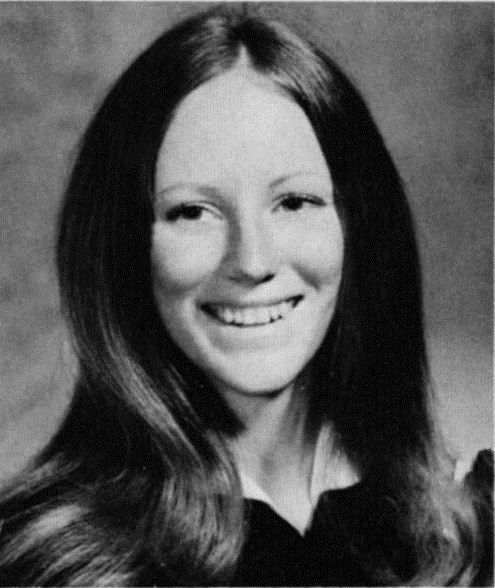
Teresa Wallin; Photo: documentingreality.com
Finding the garage open, Chase entered the home of Evelyn Miroth. A divorced mother of two, Miroth lived with her sons, Vernon (13) and Jason (6). Vernon had already left for school. Miroth's boyfriend Daniel Meredith (50) visited that day while Miroth was babysitting her 22-month-old nephew, Daniel Ferreira. While Meredith and Jason were gone shopping for supplies for an outing with neighbors, Chase broke in and shot and killed Miroth and young David. Meredith and Jason were killed when they returned from the store.
Chase proceeded to mutilate and desecrate Evelyn Miroth's body. Miroth was sodomized both with a knife and by Chase post mortem. David Ferreira was missing when the murders were discovered by neighbors. There was blood near his crib, along with brain matter.

Daniel Ferreira; Photo: thevampirekiller.weebly.com
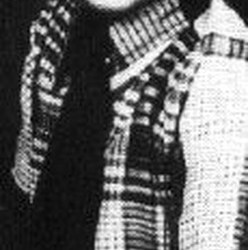
Jason Miroth; Photo: thevampirekiller.com
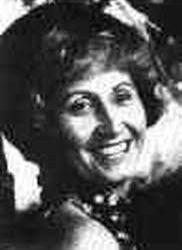
Evelyn Miroth; Photo: thevampirekiller.com
Investigaters determined that all of the murders were committed in close proximity of each other with a.22 caliber pistol. Police had only a very basic, common description of a suspect: a white male in his 20's with long hair. Investigaters suspected that the perpetrator lived nearby and began to canvas the area.
Chase's life up until December 1977 had been a rollercoaster of highs and lows with periods of stability, followed by extreme instability. He had a few brushes with the law and spent time in mental institutions. Chase's troubles begin during adolescence.

Richard Chase; Photo: richard-chase.weebly.com
Richard Trenton Chase was born in Sacramento, California on May 23, 1950. During childhood, Chase seemed normal. He participated in Little League and was a Boy Scout. However, his parents, computer specialist Richard Chase Sr. and schoolteacher Beatrice, did not get along. Beatrice accused her husband of cheating on her and abusing drugs. Chase's younger sister, Pamela, described her father as a stern disciplinarian who had no qualms about doling out physical punishment, to his son in particular.
The beginning of Chase's troubles can be traced back to his first arrest for possession of marijuana in 1965. Chase was by all appearances a normal teenager. He had joined Track and Field and began dating. His drug use began around the time that girls who dated him spread stories about Chase's sexual inadequacy. The teenager suffered from erectile dysfunction. Besides marijuana, Chase began using LSD and amphetamines. His demeanor changed as Chase went from neatly groomed to dirty and disheveled. He became irritable and inconsiderate.
Shortly after enrolling in American River College in 1968, he left to start the first of many jobs in the office of the Retailer's Credit Association. He also began seeing a psychiatrist for his erectile dysfunction.
During Chase's adulthood, he would move around from house to house and apartment to apartment. He moved back and forth between his divorced parents in Sacramento, his grandmother in Los Angeles and lived with roommates as well as on his own. His mother would complain about Chase's violent outbursts. His grandmother witnessed him talking to himself and wrapping his head with towels filled with orange slices. His father, in denial of his son's mental illness, thought his son just needed to get a job.
Chase's roommates complained about his constant drug use and extreme paranoia. Chase boarded up his bedroom door and created a hole in the back of the closet for him to come and go through. He also walked around naked in front of female company.
Chase complained about his physical ailments constantly, claiming that his heart was stopping, that he had trouble with his blood circulation and that he had pains in his chest and legs.
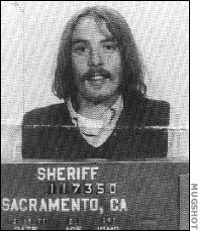
Photo: crimemuseum.org
Eventually, Chase's bizarre behavior would cause him to be committed to a couple of mental institutions. He would enter withdrawn and defiant then show a complete turn-around. Upon release, Chase would revert to his former behavior.
After his last release from the Beverly Manor psychiatric institution, his mother decided to take Chase off his medication. She didn't like the "zombielike" effect medication had on her son. Soon after, he went back to taking illegal narcotics.
He had also been arrested for a fight at a friend's party where it was found that Chase was carrying a .22 caliber pistol. He was also arrested in Pyramid Lake, Nevada where he was found running around naked and covered in blood. He had two blood stained guns and a bucket of blood containing a liver that was later determined to come from an animal. He also had his two dogs with him. Chase was released.
Shortly after the investigation began, police received a tip from a high school acquaintance of Richard Chase. Nancy Westfall crossed paths with an unrecognizable Rick Chase, a man who was dirty, disheveled and behaving strangely.
Chase opened the conversation with the bizarre question: "Weren't you on Curt's motorcycle when he was killed?" She said no and asked him who he was. Recognizing the name and not the person, Westfall tried to get away from Chase. He followed her around the store and still tried to talk to her. Chase even followed her into the parking lot and tried to get into her car. Westfall was so creeped and out by Chase that she sped out of the lot.
Westfall's description of Chase piqued Detective Bill Roberts' interest. He decided to pay Chase a visit at his apartment complex on Watt Avenue. However, Chase lived in two different units at the apartment complex, apartment 12, then 15. Detective Roberts had apartment number 12 as his address.
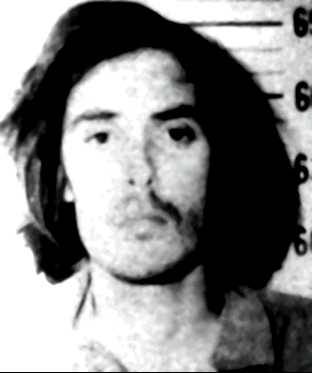
Photo: Murderpedia
Unable to locate Chase, the detective didn't give up. He continued looking deeper into Chase's background and found out about Chase's prior arrests, history of violence and confinement in psychiatric institutions. He also found out about Chase's arrest in Nevada and his current address at apartment 15 on Watt Avenue.
Detectives Roberts, Irey and Baker unsuccessfully tried to get Chase to open the door. They told Chase that they were leaving to get a warrant. Detective Roberts was going into another apartment to call the station to give his superiors an update. Detectives Irey and Baker walked downstairs and waited just out of sight to see if Chase would try to leave.
As Detective Roberts was on the phone, the apartment manager burst in, yelling that his partners needed help. Downstairs, Detective Roberts found that after a scuffle, Detective Baker subdued Chase.
Chase was in possession of the following: a box containing bloody rags and papers, brain matter in an envelope and David Ferreira's diaper pin; Daniel Meredith's wallet, containing the deceased's driver's license and credit cards in his back pocket and a .22 caliber pistol.
Chase's apartment reeked and there was blood everywhere. Pieces of David Ferreira's brain were found in the bedroom, along with feces on the floor and pictures of human internal organs decorating the walls.

Photo: Pinterest
At first, Chase denied having anything to do with the murders. He was interviewed by four psychiatrists to determine whether or not he could be determined "legally insane." However, the legal definition of insanity differs from what the general public would consider insane. If found to be legally sane, Richard Chase would face the death penalty.
All four psychiatrists determined that while Chase was mentally ill, he was cognizant of his actions. Chase understood that murder was wrong.
Eventually Chase broke down and admitted to the murders. He said that he knew it was wrong to kill his victims but saw no other alternative since he was denied medical treatment. Chase saw ingesting blood as a treatment for his imagined disorder. Animal blood didn't work so he decided to resort to killing humans for their blood.
David Ferreira's remains were found in a box by a janitor at Arcade Wesleyan Church on Whitney Avenue in Sacramento (which intersects the street where Chase lived). It was determined that the child was decapitated and his blood and brain were consumed by Chase.
After five hours of deliberation, Chase was found guilty of six counts of murder in the first degree on May 8, 1979. He was sentenced to death one week later.
Before he could face the gas chamber, Chase was found dead in his cell at San Quentin Penitentiary on December 26, 1980. His death was officially determined to be a suicide. Chase overdosed on an antidepressant, Sinequan, which he was hoarding instead of taking.
- Missy Dawn
Sources:
"Vampire: The Richard Chase Murders," by Kevin Sullivan, published by Wild Blue Press, 2014.
Articles on crimemuseum.org and Murderpedia.
51 notes
·
View notes
Text
Hyo-jin Moon and guns

▲ Hyo-jin with his father, Sun Myung Moon
In The Shadow Of The Moons: My Life In The Reverend Sun Myung Moon’s Family
by Nansook Hong
Little, Brown & Co. Boston, New York, Toronto & London, 1998
extracts:
page 57
I did not know Hyo Jin well but I had heard enough to know he was the black sheep of the Moon family. He was in elementary school when the Moons moved to America. He had been a diligent, if reluctant, student in Korea. Peter Kim, the Reverend Moon’s personal assistant, was assigned to tutor the young heir apparent. Hyo Jin vowed that when he went to America, he would have more freedom than he had known in Seoul.
The move to the United States was not an easy transition for him. Life was even more isolated in the Moon compound in Tarrytown than it had been in Seoul. At home the Moon children were left to the care of church elders and baby-sitters. At school they were the ultimate outsiders.
They were sent to the private Hackley School, where their identities as Moonies subjected them to teasing or outright scorn. Hyo Jin was expelled from Hackley in middle school for bringing a BB gun to school and shooting at several classmates.
page 58
After Hyo Jin was expelled from Hackley, the Reverend Moon sent him to live with Bo Hi Pak, one of his original disciples, in McLean, a wealthy Virginia suburb outside of Washington, D.C. It was the Reverend Moon’s theory that his followers were responsible for rearing the Messiah’s children. The Reverend Moon, after all, was responsible for the care of the world. It was an odd theory for a man who claimed to be the model father of the ideal family, and no one felt the dichotomy more than Hyo Jin Moon.
Hyo Jin’s behavior only deteriorated in Washington. In a large public school, there were fistfights and worse. It was in Washington that he was first introduced to illegal drugs.
page 59
A frustrated Reverend Moon sent Hyo Jin back to Korea for high school, hoping that the supervision of church elders in his own culture would straighten him out. It did not work out that way.
page 60
“When I went to Korea, I started going out with many girls,” he confessed in his 1988 speech to members.
“I really loved one in particular and wanted to marry her. Her parents liked the idea; they thought Father had a lot of money. They encouraged both of us, invited me to their home. They were nice to me. We became very close, almost lived together. I had sex with her. I wanted to do everything in my power to stay with her. I wanted to be matched with her or nobody else. After school, I would sleep over at her house and she at my house, all through high school.
I drank a bottle of whiskey a day. If I didn’t have money, I would buy corn whiskey, cheap and potent. I had to be drunk all the time…I touched bottom. I was listening to my heart cry. I started suffocating. I wanted to kill myself. How could I face Father. I thought the best way was to disappear, then I would have no burden. Many times I sat with a gun pointed to my head, practiced what it would be like. I only cared about my physical body. I was worse than other kids. I was so physical and selfish. I didn’t care how I affected other people. That’s how I grew up.”

▲ Moon married 15-year-old Nansook Hong to Hyo Jin Moon. Sun Myung Moon broke New York State law.
page 182
Manhattan Center became the fuel that powered Hyo Jin’s moral collapse. It was a source of ready cash to finance his cocaine habit, his growing arsenal of guns, and his nightly drinking binges.
He would order his inner circle to accompany him to Korean bars in Queens, where he cavorted openly with “hostesses” and drank himself senseless.

▲ Nansook Hong in 1999
His verbal abuse of me had grown from obscenity-laden insults to threats of physical harm. He would open the gun case he kept in our bedroom and stroke one of his high-powered rifles. “Do you know what I could do to you with this?” he would ask. He kept a machine gun, a gift from True Parents, under our bed.

page 166
[Mrs. Moon] returned from her closet safe with a Gucci handbag. It contained a hundred thousand dollars in cash. This was “seed money” for our family’s future, she told me. I should invest it wisely, perhaps in gold. Later, she said, she would give us another three hundred thousand dollars. Was she bribing me? I was advised to store it in a safe deposit box in a bank in Tarrytown. Had I deposited it in a savings account we would have to do the unthinkable: pay taxes on it. The safe deposit box was a mistake, of course. It provided Hyo Jin with ready access to cash. He used the money that was earmarked for our children’s future to buy a thirty-thousand-dollar gold-plated gun for Father and motorcycles for himself and his brothers.”
__________________________________________
Divorce, Drugs, Jail, a Nasty Custody Battle—Family Woes Lay Bare the Dark Side of the Reverend Sun Myung Moon
By Alex Tresniowski
The disillusioned seem to include many of his children, who were raised with a lack of parental supervision in an atmosphere of incredible luxury at two sprawling Westchester County estates, East Garden and Belvedere. The kids were treated to private hairdressers and fawning attendants and were brought up mainly by nannies while the Moons traveled. When Un Jin expressed an interest in horses, Moon built her a $10 million riding facility; Hyun Jin’s fondness for guns led to construction of a huge shooting range. “The sons, especially, are very arrogant,” says the former Moon friend. “They have egos that you couldn’t fit into a banquet hall.”
In 1996, Hyo Jin spent three months in a Massachusetts jail for failing to pay lawyers’ fees related to his divorce, and this February he was locked up for 20 days in Westchester County jail for violating an order of protection obtained by his wife. That followed his 1994 arrest for drunk driving and two 1995 stays at substance-abuse treatment centers, including the Betty Ford Center in California. Hong’s affidavit claims that Hyo Jin—now working as a music producer at the church-affiliated Manhattan Center Studios in New York City—once brought home a box filled with $1 million in cash, then spent $400,000 “buying cocaine and alcohol, entertaining his friends every night and giving expensive gifts to other women.” In September of 1996, during his ongoing divorce proceedings, Hyo Jin filed for bankruptcy (he later withdrew the filing). A deposition in the case quotes him as stating, “All I like was guns and music.”
Hardly the kind of devotion that is likely to attract new followers to the cause. Even so, says attorney Herbert Rosedale, a prominent Moon critic, “the church’s activities are still strong, and their recruitment is still very active.” Indeed, the church still owns the influential conservative newspaper Washington Times, is developing vast tracts of land in South America and operates various foundations that promote Moon’s family-values message.
Link to the full Alex Tresniowski story
__________________________________________
Ashamed to be Korean
Kook-jin Moon out shooting
Second Generation gives a testimony on life with Hyo Jin Moon
Hyo Jin Moon came to court in Concord in the company of no fewer than four high-priced attorneys to fight Nansook Hong
Nansook Hong’s video gets over one million views with FULL TRANSCRIPT of the ‘60 Minutes’ with Mike Wallace
Hyo-jin Moon jailed for 90 days for failing to pay Nansook Hong as ordered by the court
Nansook Hong, transcripts of three interviews, including ‘60 Minutes’
Nansook Hong interviewed by Herbert Rosedale
Nansook Hong: “I snatched my children from Sun Myung Moon”
Nansook Hong – In The Shadow Of The Moons book
Whitney Houston a no-show at Moon’s mass wedding ceremony
Nansook Hong – The Dark Side of the Moons
A review of Nansook Hong’s revealing book
_________________________________
Spanish
Nansook Hong entrevistada
‘A la Sombra de los Moon’ por Nansook Hong
Secta Moon, a modo de introducción
_________________________________
French
J’ai arraché mes enfants à Moon – Nansook Hong
« L’ombre de Moon » par Nansook Hong
Transcription de Sam Park vidéo en Français
_________________________________
German
Nansook Hong – Ich schaue nicht zurück
Niederschrift von Sam Parks Video
_________________________________
Japanese
Nansook Hong’s interview on ‘60 minutes’ translated into Japanese
TV番組「60分」で洪蘭淑インタビュー
わが父文鮮明の正体 – 洪蘭淑
文鮮明「聖家族」の仮面を剥ぐ – 洪蘭淑
サム·パークビデオの書き起こし文
_________________________________
Polish
„W cieniu Moona” – Nansook Hong
Sam Park i jego historia
#Guns#Hyo Jin Moon#Sun Myung Moon#Unification Church#Family Federation for World Peace and Unification#Nansook Hong
1 note
·
View note
Text
Why I defend Johnny Depp
A while ago I did a thread on twitter about why I believed in Johnny's innocence and I think it's time to bring it here. I warn you in advance, it’s going to be a long post.
1. First of all because just because a woman accuses a man of dv doesn't mean I'm gonna believe her without any proof. Women can be as abusive as men. Get that through your head.
2. Amber first asked for divorce citing "irreconcilable differences", not a single mention of the abuse.

3. Before asking for the RO, she sent an extortion letter to his team demanding cars, money, apartments, spousal support and for him to pay all her legal fees or she would go to the media with the thing of the abuse
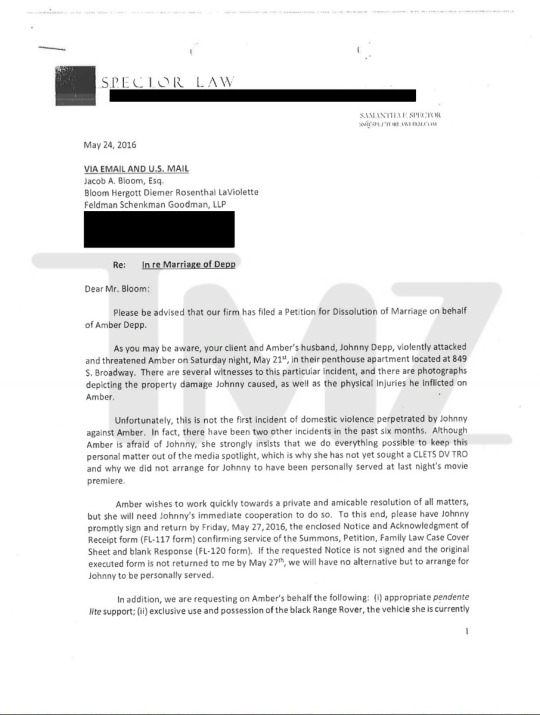

4. After he denied these requests she, of course, went public with the dv saying Johnny abused her mentally and physically throughout their entire relationship
5. Lets talk about the incident with his finger that happened in Australia, she wasn't even there at the time.
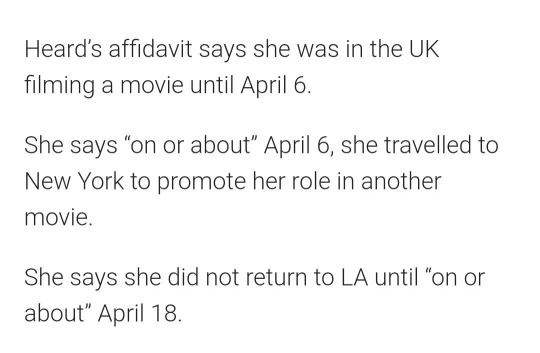
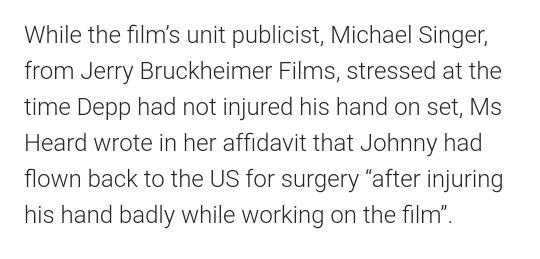

6. We have then, the incident that happened on May 21 which by the way it was the same day that Doug Stanhope and his girlfriend were at Johnny's house comforting him because of his mother's death. As Doug said in his article, Johnny told them that his mood wasn't just for his mother but that now Amber was going to leave him and I quote: "threatening to lie about him publicly in any and every possible duplicitous way if he didn't agree to her terms"
And that's exactly what happened. She sent that letter demanding all those things. He refused. She went to the media. So simple.
Going back to the incident that happened that night, THE POLICE went to their apartment and saw NO EVIDENCE of abuse. No bruises, no damaged property. NOTHING. Amber refuse to file a report.
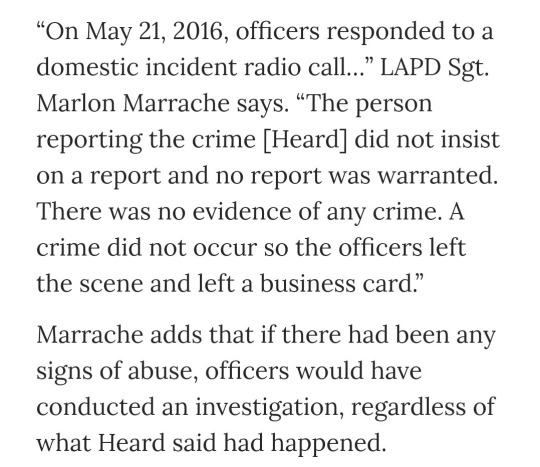
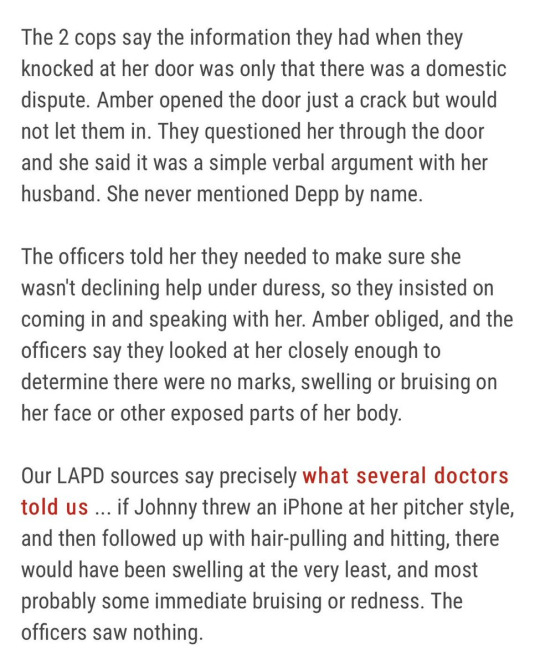
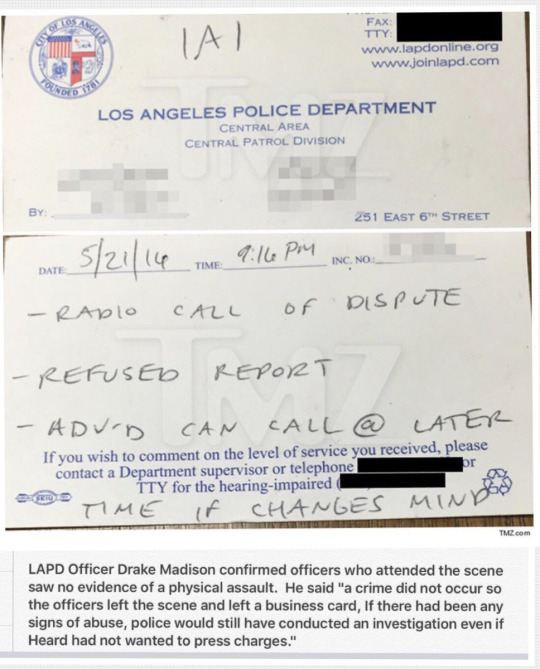
8. Then in May 22, the day after, she appears at a friends party and looks fine. A picture was posted on ig but was deleted. Wonder why...
9. On May 27 she goes to the court to ask for a RO with a visible bruise on her face but the day after the bruise was gone?????
10. She said that she wanted to keep this matter out of the public eye, yet she sold pictures to People Magazine.
11. I'm gonna address here that she was arrested for domestic violence against her then partner. She went to court and was given a two year probation And of course she tried to erase her record when she met johnny. What a coincidence uh?
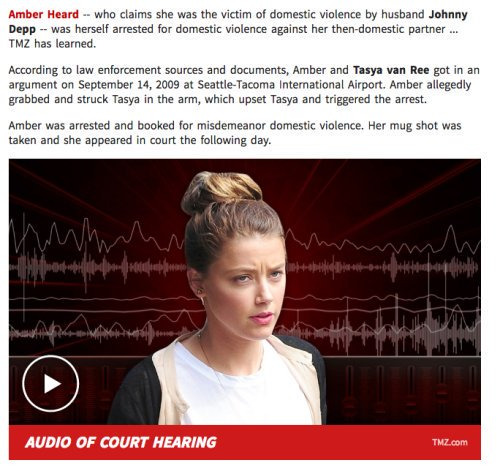
And don't come up to me saying that Tasya came on her defense because it was 7 years later. She didn't do shit back then to try and stop the trial. And by the way, the cop that arrested her is lesbian so your argument of "she was homophobic" doesn't fit here
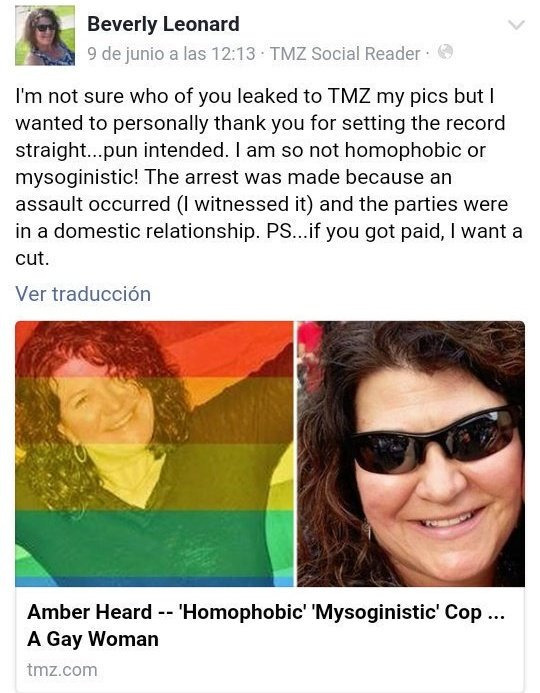
12. Neighbours and people who worked on the building where they lived saw Amber with NO BRUISES on her face. Their bodyguards said she was the one who needed to be pulled off him.
13. Amber avoided her deposition 3 times. THREE TIMES. Until the judge said it was time for her to sit down and give one. First she said she couldn't because she needed to be in London for a fitting but that turned out to be false.
Then she was at her best friend engagement party (priorities) and so on. So confusing that she said she wanted to be divorced from him asap but wouldn't sit to give her deposition.
14. Johnny submitted his evidence and witnesses to the court and three days after that and a day before she could have obtained a PRO she dropped everything WITH PREJUDICE. He had police officers in his witnesses list btw
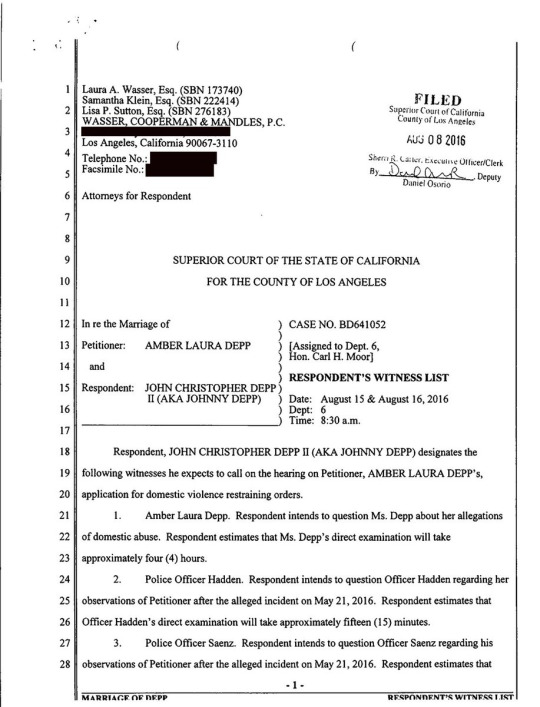
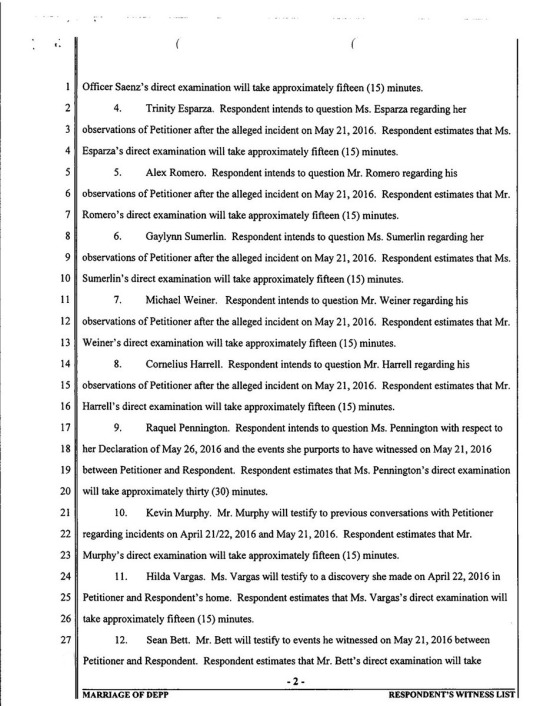
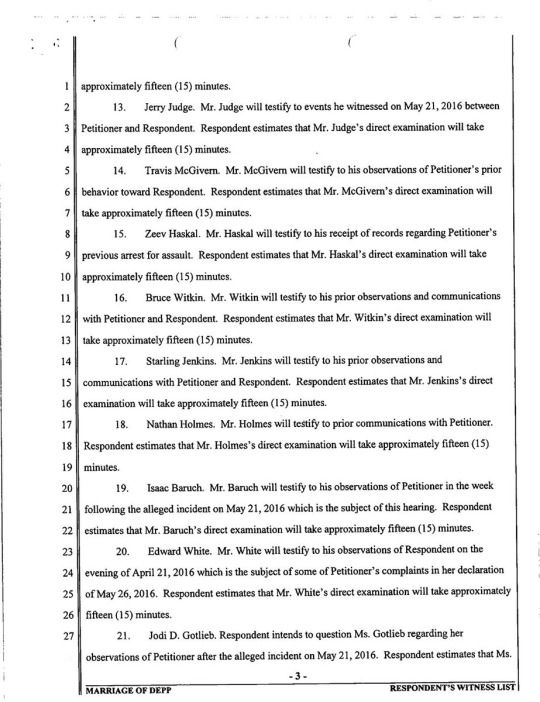
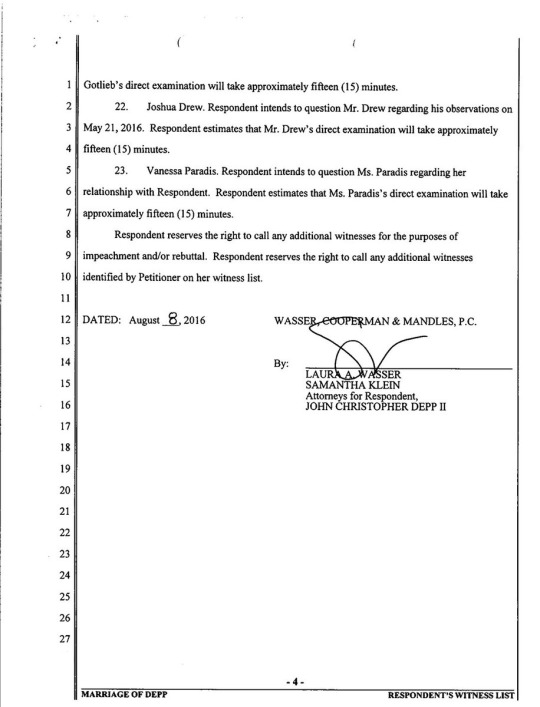
15. These are Johnny's evidence that were presented to the court. She didn't include in hers those text messages that apparently Johnny's assistant sent to her and also she didn't cite him as a witness. He was willing to testify under oath on Johnnys side. They were never verified
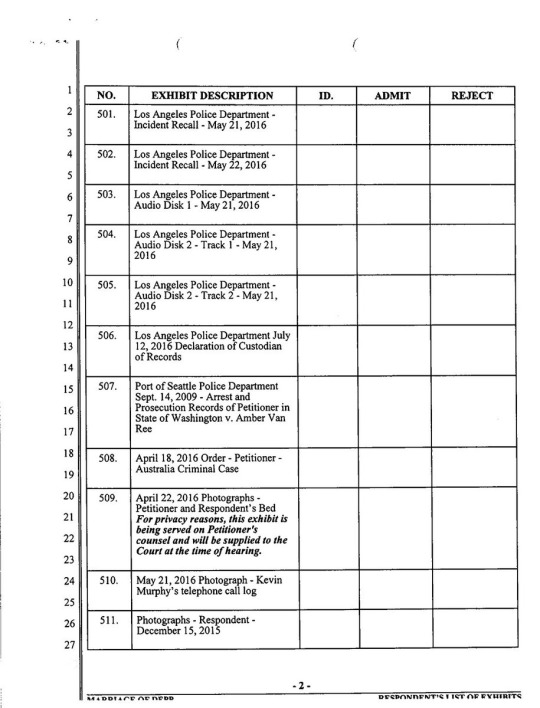


16. After she said she was going to donate the money to charity (because people were calling her a gold digger), Johnny was going to send the money directly to those charities but she refused and was going to take him to court. Again, mysterious shit going on with this girl
17. During their marriage, Johnny was seen with scrathes and bruises. She hit him in that car episode, even if it was a joke, I wouldn't dare to hit the man who behind close doors makes me fear for my life. But whatever, it doesn't seem important for anybody.
18. And lets talk about the video. If you think that somebody who has been abusing his wife throughout their entire relationship is going to chose to break glasses and smash cabinets instead of hitting the person, then I don't know what to say. In the video Johnny's pissed off about something that has NOTHING TO DO WITH HER. He says it very clearly. She asks him multiple times what happened and he replies with: "Were you here this morning?". She says no and he answers: "Then nothing happened TO YOU this morning".
He tries so hard to ignore her but she keeps asking him and trying to make the problem about her to get a violent action from him but that never happens. He doesn't even scream at her. Then she said she was sorry, what does that have to do with all of this? And lets get this clear, he NEVER throws anything at her. He NEVER touches her.
As Johnny said in his GQ interview this fall, his mood in that moment was because he found out about his financial situation. She knew he was in a bad mood and tried to set him up.
It's so clear that she feared for her life when she dared to ask if he had been drinking and to record him without his consent. Then he finally finds out that she was recording him and takes the phone away from her, yet he doesn't delete the video. Sounds odd to me.
19. Amber's lawyers had to apologise to Johnny because of the statement they made saying Amber was vindicated in the court of public opinion because it wasn't true.
20. We can also talk about her controlling behavior towards him. Like in the airport where he had to say something to her so he could go and see his fans and she lets him letting his hand go with disdain.
Or at the Black Mass premiere at TIFF where she tried to stop him from chatting with another woman and tried to pull him aside. A lot of people have said that she treated him bad, like a child. They said he loved her so much that he would do anything for her and she knew it
Johnny HAS ALWAYS DENIED THESE ALLEGATIONS. Do you really think that if he was trully guilty he would risk his reputation, the love and trust of his family friends and fans by denying the requests in that extortion letter? Makes no sense.
Johnny’s lawyer has said Amber admitted beign violent to him and that they have evidence of her false allegations. And they seem pretty confident so, I really hope he gets the justice he deserves.
Johnny Depp is innocent and the truth will come out.
UPDATES:
Johnny Depp has fought off a High Court bid to temporarily halt his libel action against The Sun over allegations that he beat his former wife Amber Heard.
The judge announced: “I am not satisfied on the current evidence that Ms Heard’s concerns about the restrictions that the divorce agreement imposes on her are well-founded.”
Mr Justice Nicklin said Depp had stated clearly in his evidence to the court that he expects Heard “may well” give evidence in the proceedings, and “he will not attempt to prevent that”.
He added: “The fact that Ms Heard presently thinks that there is some impediment to her giving evidence for the defendants is nothing to do with Mr Depp.
Here we have, again, her trying to avoid a trial, her avoiding to give the evidence she claims she has.
Johnny has also filed a defamation lawsuit against Amber in which he asks for $50 million.
In the suit, Depp calls the “false allegations” against him “an elaborate hoax to generate positive publicity” for her and “advance her career.” The lawsuit strongly states that she is the one attacked him, claiming, “Ms. Heard is not a victim of domestic abuse; she is a perpetrator.”
He claims that Heard’s abuse claims were “conclusively refuted by two separate responding police officers, a litany of neutral third-party witnesses, and 87 newly obtained surveillance camera videos.”
The lawsuit claims that an employee of the building reviewed building surveillance video three days after the alleged incident. Depp claims the employee “testified under oath that she saw Whitney Heard pretend to punch her sister in the face. Then Ms. Heard, Ms. Pennington [Heard’s best friend], and Whitney Heard all laughed.”
Depp also details an incident one month into their marriage where he claims she threw a glass vodka bottle at him, which shattered when he made contact with his hand. He claims his finger had to be surgically reattached and claims Heard “disseminated false accounts of this incident, casting Mr. Depp as the perpetrator of his own injury.”
Amber Heard is just a fucking psychopath, if things aren’t the way she wants she will go crazy and Johnny loved her so much that he did everything that was in his hand to keep her happy and yet, she did this to him.
We can also talk about the multiple witnesses he has:
Esparza said under oath that she did not see any visible injuries to Heard’s face or body in the days following the incident and up to the police investigating. She explained how close in proximity she was to Amber and claimed there were no injuries.
However, Esparza did note that on May 27, six days after the reported incident, Heard did have a visible injury, including a “red cut underneath her right eye and red marks by her eye.”
After seeing the images, Esparza testified that she went back and reviewed security footage from the building because the “time didn’t add up” and she suspected the allegations against Depp were “false.” The concierge services owner was adamant she had seen the actress “several times” without a mark on her face.
Then we have this:
A second employee of the building, a security guard named Alex Romero also claimed to have seen Heard multiple times throughout the week and said he did not see anything to indicate that Heard had been “punched by anyone,” or had anything thrown at her, like a cell phone.
The security guard said he seriously doubted the actress’ story once he saw her photos, describing on record, “I saw the pictures and the next day I saw her. I was like come on, really. I couldn’t believe,” adding, “When I saw her in person, I didn’t see anything.”
Two other employees — including the general manager of the building, Brandon Patterson — also testified that Heard was observed multiple times in the building following the alleged assault and was seen “without bruises, cuts, redness, swelling or any other injuries to her face.”
They also testified that building surveillance captured lots of video of Heard without any visible injuries like the ones seen in the photographs.
Baruch, who admits he’s been friends with Depp for 37 years, said Heard “stretched her neck” to show him her alleged injuries, and said he could not see any injuries while standing less than a foot away from her face. Baruch was adamant that he did not even see any redness or swelling.
Baruch also describes a bizarre encounter with Heard a few weeks later, on June 3, where she invited him over for dinner while Depp was out of town. The neighbor said he declined, and stated, “I think it’s best that we don’t talk anymore because I’m confused, angry and frustrated by what I’ve been seeing.”
So, Johnny has all of these evidence, yet people still believe her, because a woman can’t lie about domestic violence and we have to believe her just because she is a woman.
Johnny Depp suffered domestic abuse from his ex wife and he has PHOTOGRAPHS OF THE INJURIES SHE CAUSED HIM, WITNESSES TESTIMONIES, AUDIO TAPES AND 87 SURVEILLANCE SECURITY CAMERA VIDEOS to let you all know and let the court know THAT SHE LIED AND THAT HE IS INNOCENT.
WE ARE WITH YOU JOHNNY.
2K notes
·
View notes
Text
Fired CNN producer John Griffin may plead guilty this month to federal charges related to luring a woman and her young adopted daughter to his Vermont ski house where he sexually abused the child, court documents indicate.
Griffin, a former Connecticut resident who lived in Stamford and Norwalk, is accused by federal authorities of trying to lure women and their daughters to his Vermont home for “sexual training." I
In one case, a Nevada woman and her 9-year-old adopted daughter flew to Boston where Griffin picked them up and brought them to his Vermont house. While they stayed at his home, authorities said Griffin molested the child, court documents said.
Griffin was indicted by a federal grand jury last December in Vermont and arrested in Connecticut on three counts of using a facility of interstate commerce to attempt to entice minors into engaging in unlawful sexual activity. Each of the charges carries a minimum 10-year prison sentence, federal authorities said at the time of his arrest. Griffin has been held by federal authorities since he was taken into custody in December. He was fired from his job at CNN a few days later.
His attorney David Kirby, a former Vermont federal prosecutor, requested and received a two-month stay on the federal charges so discussions could continue on a plea arrangement, according to documents filed in September.
Griffin is scheduled to appear Nov. 21 before Vermont U.S. District Judge William Sessions III for a pretrial conference "and/or (a) change of plea," court documents said. Kirby confirmed Wednesday there is a hearing on that date for Griffin, but declined to comment on the reason for the proceedings.
The adoptive mother was arrested and sentenced to eight to 20 years in prison in Nevada in connection with the incident. The child and her guardian, who are now living in Connecticut, claim in a lawsuit filed in January against Griffin that the girl was forced to commit sex acts while she was at the Vermont home. The child was 9 when the incidents occurred in July 2020, court documents in the lawsuit said.
Griffin has not been charged with sexually assaulting the child.
The lawsuit has been on hold until the criminal proceedings are finished. Griffin, a former CNN producer for Chris Cuomo and others, was required to sell the Vermont ski house and give his half of the proceeds — $1 million — to the federal court so he will have the funds to pay any fines or restitution as part of his sentence, court documents show.
The 10-page indictment alleges Griffin frequently used Kik, a messaging application, and Google Hangouts to lure women with young daughters to meet him at the Vermont house he had bought with his wife to provide “sexual training” on how to be “submissive” to men. Griffin boasted in web chats that he had trained girls as young as 7 years old, federal authorities said.
His wife, who filed for divorce weeks after he was taken into custody, was not implicated in the scheme, officials said.
7 notes
·
View notes
Photo

REVIEW
An Everyday Hero by Laura Trentham
Heart of a Hero #2
Eagerly anticipated and well worth waiting for! The second book in this series takes on a new set of characters living in a new town but continues to deal with life issues of military veterans and the people that are in their lives. In some ways it is the story of dreams and goals that were held dear for years and yet something happened in life to derail, detour or destroy the dream from appearing as reality. Greer had dreams of being a hit in the music business, Emmett dreamed of adding to the family military legacy in a big way, Ally and her mother dreamed of a family life with father and husband and yet...those expectations were not to be. And yet...when things don’t go as expected there is always the opportunity to do one of two things...wallow or move on and make the best of it. I really enjoyed this book!
What I liked:
* Greer: banged up and bruised and wallowing a bit she is given a job to do and in doing community service impacts Ally and Emmett in ways that improved her life, too. I liked the way she interacted with Emmett and with Ally...she is a person I wouldn’t mind having as a friend.
* Emett: withdrawn and nursing his wounds he is hermit-ting and wallowing until Greer shows up and begins to draw him out. When he started to emerge I really REALLY began to like him.
* Ally: an old soul that had more on her plate than a fifteen year old should have to deal with. She was tough with a soft center – was rooting for hermit-i
* The parents of Emmett and Greer – they were a soft place to land for their children even though their children might not have always realized it. It did take a bit to warm up to Emmett’s father but all’s well that ends well.
* The military persons from old and current wars that made appearances
* Eddie the horse and Bonnie the cat
* The big reveal...and how it impacted more than one
* Even the sad bits were heartwarming and gave a positive vibe for the future
* The “realness” of the story
What I didn’t like:
* The fact that sometimes people, for whatever reason, opt to escape and in doing so harm not only themselves but others...but...that is life. If those people are lucky they will have people come into their lives that can help them do a U-Turn.
I can’t wait for book three…
Thank you to NetGalley and St. Martin’s Press – Griffin for the ARC – This is my honest review.
5 Stars

SYNOPSIS
Laura Trentham, the author of The Military Wife, is back with an emotionally charged novel about redemption and second chances. In the vein of Josie Silver’s One Day in December, AN EVERYDAY HERO (St. Martin’s Griffin, February 4, 2020, $16.99), explores the challenges of a relationship and ultimately discovering that love…and joy is worth fighting for.
At thirty, Greer Hadley never expected to be forced home to Madison, Tennessee with her life and dreams of being a songwriter up in flames. To make matters worse, a series of bad decisions and even crappier luck lands her community service hours at a nonprofit organization that aids veterans and their families. Greer cannot fathom how she’s supposed to use music to help anyone deal with their trauma and loss when the one thing that brought her joy has failed her.
Then there's Emmett Lawson, the golden boy who followed his family’s legacy. Greer shows up one day with his old guitar, and meets Emmett’s rage head on with her stubbornness. A dire situation pushes these two into a team to save a young teenager, but maybe they will save themselves too. . .
BUY LINKS
Macmillan: https://us.macmillan.com/books/9781250145550
Amazon: https://www.amazon.com/dp/1250145554?tag=macmillan-20
Barnes & Noble: https://www.barnesandnoble.com/w/an-everyday-hero-laura-trentham/1131936712;jsessionid=B7619745B109010F501CA5500AB3BAF3.prodny_store02-atgap02?ean=9781250145550#/
Books-A-Million: https://www.booksamillion.com/product/9781250145550?AID=42121&PID=7992675&cjevent=1101dd10476711ea83cc00ae0a240614
Indie Bound: https://www.indiebound.org/book/9781250145550?aff=macmillan
Powell’s: https://www.powells.com/book/an-everyday-hero-9781250145550?partnerid=33241

EXCERPT
Chapter 1
“Disorderly conduct. Public intoxication. Resisting arrest.” Judge Duckett put down the paper, linked his hands, and stared over his reading glasses from his perch behind the bench with a combination of exasperation and fatherly disapproval.
Greer Hadley shifted in her sensible heels and smoothed the skirt of the light pink suit she’d borrowed from her mama for the occasion. “I’ll give you the first two, Uncle Bill—” The judge cleared his throat and narrowed his eyes. “Excuse me—Judge Duckett—but I did not resist arrest.”
“That you recall.” Deputy Wayne Peeler drawled the words out in the most sarcastic, unprofessional manner possible.
She fisted her hands and took a deep breath. The impulse to punch Wayne in the face simmered below the surface like a volcano no longer at rest. But ten o’clock on a Monday morning during her arraignment was not the smartest time to lose her temper, and she’d promised herself not to add to her string of bad decisions.
She sweetened her voice and bared her teeth at Wayne in the facsimile of a smile. “I recall plenty, thank you very much.”
Truth was she didn’t recall the minute details, but the shock of Wayne’s whispered offer on Saturday night to make her troubles go away for a price had done more to sober her up than the couple of hours spent in lockup waiting for her parents.
Dressed in his tan uniform, Wayne adjusted his heavy gun belt so often she imagined he got off every night by rubbing his gun. Giving him a badge had only empowered the part of him desperate for respect and approval. His nickname in high school, “the Weasel,” had been well earned.
Unfortunately, she was the unreliable narrator of her life at the moment and no one would trust her recollections. Judge Duckett, her uncle Bill by marriage until he and her aunt Tonya had divorced, rustled papers from his desk.
The ethics of her former uncle acting as her judge were questionable, especially considering they had remained close even after he’d remarried, but if nepotism is what it took to make this nightmare go away, then she wouldn’t be the one to lodge a complaint.
“A witness claimed you were sitting quietly at the end of the bar until a song played on the jukebox. What was the song?” Her uncle glanced at her over his glasses again, which made him look like a stern teacher.
“‘Before He Cheats’ by Carrie Underwood.” She forced her chin up.
His mouth opened, closed, and he dropped his gaze back to the paper. A murmur broke out behind her.
She would not cry. She wouldn’t. She blinked like her life depended on a tear not falling. Later, in the privacy of her childhood bedroom, she would bury her face in the eyelet-covered pillow and let loose.
Beau Williams, her cheating ex-boyfriend, was only partially to blame for her embarrassing behavior. It was a confluence of setbacks that had had her holding down the end of the bar. Hearing Carrie’s revenge anthem had hit a nerve exposed by the shots of Jack. Rage had quickened the effects of the alcohol, and that’s when things got fuzzy.
“Yes, well. That is a rather … Let’s move on, shall we? The witness also claims after a heartfelt, albeit slurred speech about the vagaries of relationships and how the moral fiber of the Junior League of Madison was frayed, you fed five dollars into the jukebox and played the same song for over an hour. ‘Crazy’ by Patsy Cline, was it?”
Ugh. She didn’t recall how much money she’d fed the machine, but it sounded like something she would do. “Crazy” was one of her favorite songs. A master class in conveying emotion through simple lyrics. She was just sorry she’d wasted five dollars on Beau. He didn’t deserve her money, her heart, or Patsy.
“No one can fault my taste in the classics.” Greer tried a smile, but her lips quivered and she pressed them together.
Her uncle continued to read from the witness statement, “You proceeded to throw two glasses on the floor, shattering them, and attempted to break a chair across the jukebox.”
She swallowed hard. A vague picture of a frustratingly sturdy chair surfaced. The fact the chair remained intact while she was falling apart had sent her anger soaring higher and hotter. A glance from her uncle Bill over the paper had her giving him a nod. She couldn’t deny it.
He continued, “A patron called 911. When Deputy Peeler arrived, he pulled you away from the jukebox and forced you outside. That’s where, he claims, you kicked him … well, you know where.”
“Wayne dragged me down the stairs—”
“Deputy Peeler, if you please.” Wayne sniffed loudly.
“As Deputy Peeler escorted me down the stairs, I lost my balance and fell. The heel of my shoe jabbed into his crotch. Sorry.” Greer didn’t make an attempt to mask her not-sorry voice with fake respect.
If she accused Wayne of misbehavior on the job, he would deny it and spin it somehow to make her look even more irresponsible. Lord knows, she’d embarrassed her parents enough for a lifetime. Anyway, seeing him rolling on the ground and cupping his crotch had been sweet payback.
“I sustained an injury where that spike you call a heel caught me.” Wayne half turned toward her.
Instead of playing it smart and soothing his delicate male ego, she batted her eyes at him. “I’m sure that’s left the ladies of Madison real upset.”
Wayne took a step toward her. “You are such a—”
The gavel knocked against the bench and her uncle stood, looming over them. “I’ve heard enough, Deputy. Sit down.”
Wayne turned on his heel and left Greer to face her uncle Bill. This was where she would promise such a thing would never happen again, and he would give her a stern warning before dismissing all charges.
“I’m striking the resisting arrest charge. It was an accident.”
Greer forced herself not to look over her shoulder and stick her tongue out at Wayne. That left only two misdemeanors, which her uncle could expunge with a swipe of his pen.
He settled behind the bench and picked up his pen, his gaze on the papers. “You will pay for any damages.”
“I’ve already reimbursed Becky.” Technically, she’d had to use her parents’ money, considering she’d crawled home from Nashville broke. “And apologized profusely. You can be assured there will not be a repeat performance. I’ve learned my lesson.”
“Good. As for the other charges…”
Her deep breath cleansed a portion of the tension across her shoulders, and a smile born of relief appeared.
“You will perform fifty hours of community service.”
Her smile froze on her face. It sounded like a lot, but she’d been stupid and immature and deserved punishment. “I understand. Clean roads are important.”
“Litter pickup? Goodness no.” He took his glasses off and smiled at her for the first time, but it wasn’t the jolly-uncle smile she was familiar with. “You have talents that would be wasted on the side of the road picking up trash, Ms. Hadley. You will spend your fifty hours working at the Music Tree Foundation.”
“I’m not familiar with it.” She swallowed. The mention of music set her stomach roiling. “Highway 45 was in terrible shape on my drive in last week.”
“The foundation is a nonprofit music program that focuses on helping military veterans and their families cope with the trauma they’ve endured serving our country. They’re in need of volunteer songwriters and musicians.”
“I can’t write or play anymore.” Her dream of hearing one of her songs on the radio had died. Not in a blaze of glory but from a slow, torturous starvation of hope. At thirty, she was resigned to finding a real job and cobbling together a normal life in the place she’d tried to leave behind.
“My decision is final. As far as I can determine, your brain—despite this lapse in judgment—is in fine working order. You can and will help these men and women heal through your gift of music. Unless you’d rather spend thirty days in county lockup?”
Would her uncle actually throw her in jail? For a month? “No, Your Honor, I don’t want to go to county lockup.”
“Good. Once you turn in your log with all your hours signed off by the foundation’s manager, your record with this court will be cleared.” He handed her file to a clerk. “Case closed. Next up is docket number fourteen.”
She stood there until he met her gaze with his unflinching one. “Go home, Greer.”
Her parents were waiting at the door to the courtroom. While they’d faced the horror of having to bail their only child out of jail stoically, her mother’s embarrassment and disappointment were ripe and all-encompassing. Greer wilted and trailed her parents out of the courthouse.
She felt like a child. An incompetent, needy child living in her old bedroom and dependent on her parents for emotional and financial support. She thought she’d hit rock bottom many times over the years, but her situation now had revealed new lows.
The silence in the car built into a painful crescendo.
“The tiger lilies are lovely this year, don’t you think?” Her mother’s attempt at normalcy was strained but welcome.
Her father’s hands squeaked along the steering wheel as an answer.
Greer huddled in the backseat and stared out the window, the clumps of flowers on the side of the road an orange blur. As a teenager, she’d chafed at her parents’ protectiveness and had wanted nothing more than to escape to Nashville, where she’d been convinced glory and fame awaited. Now she was home and a disappointment not only to her parents but to herself. Even worse, she hadn’t come up with a plan to turn her life around.
“Ira Jenkins is back in the hospital. I thought I’d run by and check on him. Since Sarah passed, he seems a shell of the man he once was.” Her mother turned to face the backseat. “Would you like to come with me? I’m sure he’d be happy to see you.”
“He won’t remember me, Mama.”
“I’m sure he will.”
Greer scrunched farther down in the seat. The last thing she wanted was to make small talk with a man she hadn’t seen in years.
“You’ll have to get out eventually and face the music.” Her mother’s smile wavered and threatened to turn into tears. “So to speak.”
Her mother was trying, which was more than could be said for Greer at the moment. Her parents deserved a better daughter. Someone successful they could brag on at the Wednesday-night potlucks at church. Not a daughter they had to bail out of jail.
“I will. I promise. Just not to see Mr. Jenkins.” Greer leaned forward and squeezed her mother’s hand over the seat, needing to give her something to hope for even if Greer wasn’t sure what that might be.
Her father cleared his throat. “You need to think about the future.”
He ignored her mother’s whispered, “Not now, Frank.”
“A job. Or back to school. We’ll put you through nursing or accounting or something useful.” He shifted to meet her gaze in the rearview mirror. “But you can’t keep on like you’re doing. You need a purpose.”
“I’ll start looking for a job tomorrow.” School had never been her wheelhouse. She’d been sure she’d make it in Nashville and had never formulated a backup plan.
They pulled up to her childhood home, a two-story brick Colonial on the main street of Madison, Tennessee. Oaks had been planted down a middle island like a line of soldiers at attention. They had grown to shade both sides of the street. It was picturesque and cast the imagination back to a time when ladies lounged on porches with their iced tea and gossiped with their neighbors to escape the heat of summer. Air-conditioning had altered that way of life.
At one time, as a kid, she’d known every family up and down the street well enough to knock on their door for help or run through their backyard in epic games of tag. Now, though, the houses were being bought up by people who used Madison to escape the bustle of an expanding Nashville. They built pools in the backyards and fences and weren’t outside except to walk their trendy dogs.
The march of progress through Madison added to her melancholy sadness. There was a reason not being able to go home again was a recurring theme in books and songs.
“We love you, Greer. You know that, don’t you?” Her mother’s voice was tight with emotion, but she didn’t turn around, thank goodness.
Her mother never cried and if Greer witnessed tears, she would burst into sobs herself and embarrass everyone.
“I know. Thanks for everything. I’m going to do better. Be better.” It seemed a wholly inadequate promise she wasn’t even sure she could keep, but it was all she could manage. She ducked out of the car and skipped around to a side door of the house that was always unlocked.
Her room was both a haven and a mocking reminder of the state of her life. Posters of album covers papered the wall behind her bed, the colors faded from the sun and the edges curling with age.
In high school, she’d gravitated toward indie folk artists and away from the commercially driven country-music machine located a few miles south. Joan Baez was flanked by Patty Griffin and Dolly Parton. Even though Dolly veered more country than Greer, no one could deny the legend’s songwriting chops. The guitar Greer had hocked for rent money had borne Dolly’s signature like a talisman. Sometimes Greer ached for her guitar like a missing limb.
The flashing glimpse of a woman in a pale pink suit stopped her in the middle of the floor. She turned to face the full-length mirror glued to the back of the closet door. God, it was like glimpsing her mom through a time warp.
Greer touched the delicate pearls that had been passed down to her on her eighteenth birthday. They were old-fashioned and traditional and stereotypical of a Southern “good girl.” Not her style. She’d left them in her dresser drawer when she’d left home the day after high school graduation.
A tug of recognition of the women who had come before her had her clutching the strand in her hand as if something lost were now found. Was it her circumstances or her age growing her nostalgia like a tree setting roots?
She turned around to break the connection with the stranger in the mirror, stripped off the pink suit, and pulled on jeans and a cotton oxford. Her mother would appreciate seeing her in something besides the frayed shorts and grungy concert T-shirts she’d lounged around in the last week. She reached behind her neck for the clasp of the necklace, but her hands stilled, then dropped to her sides, leaving the pearls in place.
She stepped out of her room and was enveloped in silence. Her father had returned to his insurance office and her mother must have set off for her hospital visit. The house took on an expectant quality, as if waiting for its true owners to return. She was no longer a fundamental part of this world. Not unwelcome, perhaps, but a loose cog in her parents’ lives.
She tiptoed downstairs to the kitchen and made herself a ham sandwich. May was too early for fresh tomatoes, but in another month or two her mother’s garden would make tomato sandwiches an everyday treat.
Craving an escape, Greer grabbed a book and settled in her favorite window seat. The rest of the afternoon passed in the same expectant silence. The chime of the doorbell made her start and drop her book. If she pretended no one was home, maybe whoever was on the front porch would go away. The last thing she wanted was to face one of Madison’s gossips masquerading as a do-gooder.
The creak of the door opening had her bolting to her feet.
“Greer? I know you’re home. Are you decent?” Her uncle Bill’s booming voice echoed in the two-story foyer.
She propped her shoulder in the doorway of the sunroom. “Letting yourself in people’s houses is a good way of getting shot around here.”
“While your mama would have liked to have shot me during the divorce with her sister, I hope we’ve made our peace.” He closed the door behind him and Greer did what she’d wanted to do in the courtroom—she threw herself at him for a hug.
He lifted her off her feet and spun her once around. Her laugh hit her ears like a foreign language. It had been too long since she’d laughed from a place of happiness.
“You could have just come out to the house. You didn’t have to get arrested to see me.” Bill let her go, and she led him into the sunroom.
“Do you want something to drink?” Greer asked, already turning for the kitchen and the fresh brewed pitcher of sweet iced tea.
“No, thanks. Mary has fried chicken ready to go in the pan, so I can’t stay long.”
Bill had divorced her aunt Tonya more than a decade earlier and married the choir director of the biggest black church in town. A scandal had ensued not because he’d married a black woman, but because he, a long-standing deacon in the Church of Christ, had converted to a heathen Methodist.
“How is Mary?”
“Always singing.” He shook his head, an indulgent smile on his face, as they settled into their seats.
His comment sprinkled salt on an open wound. She’d begged off going to church with her parents because of the questions she was sure to face and the hymns she couldn’t bring herself to sing. Some of her earlier happiness at seeing him leaked out. “Good for her.”
“I came to make sure you weren’t mad at me.”
“Why would I be mad?”
“I got the impression you expected me to dismiss the charges.” His smile turned into a wince.
“I wouldn’t have been upset if you had, but I get it. I was an idiot and deserve punishment.” She picked at the fringe on a decades-old needlepoint pillow and cast him a pleading glance. “I’d rather pick up trash, though, if it’s all the same to you.”
“It’s not the same to me.” He crossed his long legs and tapped a finger on the cherry armrest of the antique chair that looked ready to surrender at any moment to his bulk. “Do you remember Amelia Shelton?”
“Mary’s daughter? She was a couple of years ahead of me in school. We didn’t hang out or anything, but she seemed nice.” Greer couldn’t remember the last time she’d seen Amelia. Greer’s side of the family had skipped Bill and Mary’s small wedding ceremony; the acrimony between him and her aunt Tonya hadn’t faded at that point.
“Amelia is the founder and director of the Music Tree Foundation and is desperate for qualified volunteers. You’ve been playing and singing and writing music since you were knee high. It was meant to be.”
“It’s not meant to be. I’ve got to get a real job.”
Her uncle made a scoffing sound. “You’re too much like my Mary. You could never leave music behind.”
“Music dumped me on the side of the road, gave me the finger, and peeled out.” Greer shook her head and touched the string of pearls, her gaze on his polished black dress shoes. “I’m a mess, Uncle Bill. I have nothing to offer. In fact, I’ll probably make things worse for whatever poor soul I get paired with.”
She expected him to argue, but he seemed to be weighing the truth in her words like the scales of justice. His shrug wasn’t in the least reassuring. “Amelia has done something really special with her foundation. It might do you a world of good to focus on someone besides yourself.”
“Dang, that’s harsh.”
He patted her knee. “I’ve seen all kinds come through my courtroom. The ones who turn it around are the ones who quit feeling sorry for themselves.”
“But—”
“But nothing. Beau is an asshole. Not the first or the last you’re likely to encounter. Don’t you deserve better than him?”
“Yes?” She wished she’d been able to put more conviction into the word.
Beau was successful, nice-looking—even though a bald spot was conquering his hair day by day—and respected in their town. They’d known each other since high school, but had only started dating in the last year.
He was solid and steady and comfortable. Three things lacking from her life. Catching him cheating with the president of the Junior League had been another seismic shift in her world, leaving her unsure and off balance.
“If you can’t believe in yourself yet, then believe me. You are talented, Greer, and you have the ability to help people find their voice.” He slipped a card out of his wallet. When she didn’t reach for it, he waved it in her face until she took it.
A tree styled with musical symbols of all different colors decorated one side of the card. She ran her thumb over the raised black ink of Amelia’s name and an address on the outskirts of Nashville. “I don’t have much choice, do I?”
“Not if you want to stay in my—and the court’s—good graces. She’s expecting you tomorrow at three.”
“No rest for the wicked, huh?” Her smile was born of sarcasm.
Bill rose and ruffled her hair like he had when she was little. “Not wicked. Lost.”
Greer walked him out, brushed a kiss on his cheek, and murmured her thanks. She leaned on the porch rail and waved until he disappeared down the street.
I once was lost, and now I’m found. She’d sung “Amazing Grace” so many times that the lyrics had ceased to have an impact. But, standing on her childhood front porch, having come full circle, a shiver went down her spine, and goose bumps broke over her arms despite the heat that wavered over the pavement like a mirage. Her granny would have said that someone had walked over her grave. Maybe so. Or maybe change was a-coming whether she wanted to face up to it or not.
Copyright © 2020 by Laura Trentham

AUTHOR BIO
Laura Trentham is an award winning romance author. The Military Wife is her debut women’s fiction novel. A chemical engineer by training and a lover of books by nature, she lives in South Carolina.
SOCIAL MEDIA
Twitter: https://twitter.com/LauraTrentham
Facebook: https://www.facebook.com/LauraTrenthamAuthor
Author Website: http://www.lauratrentham.com/
Macmillan Author Page:
https://us.macmillan.com/author/lauratrentham
#Laura Trentham#Heart of a Hero 2#St. Martin’s Press – Griffin#NetGalley#Military Veteran Romance#Contemporary Romance#Small Town Romance
0 notes
Text
Bethenny Frankel Reportedly Shouted At Ex Jason Hoppy In Court- ‘You Tortured Me!’ – Perez Hilton
Bethenny Frankel‘s legal war with ex Jason Hoppy is getting heated.
As
While the Bravolebrity is seeking primary custody and full decision-making power over their child, Hoppy wants to keep the current joint custody arrangement the same.
Per E! News, on Wednesday, Hoppy took the stand to detail the alleged harassing messages he sent to her after their divorce.
During his testimony, Jason recalled sending the Skinnygirl founder angry emails in response to a tabloid article about their split, saying:
“We settled a confidentiality agreement, I just felt like this was like an F-U to me.”
He continued:
“As I look back on this, I was a jerk… I remember one email where it was like, I think I sent her eight messages about a phone call.”
Reportedly, that’s when Frankel shouted from her courtroom seat:
“You tortured me… You tortured me!”
When the judge suggested they take a short break, Frankel reportedly exclaimed:
“No, I want to get this over with.”
However, a break was then called.
As she left the courtroom, Frankel was reportedly heard saying:
“He’s making it like he was just a jerk… He tortured me every single day. Tortured me every day.”
During the hearing, Hoppy went into further detail about the way he allegedly treated his ex-wife.
“I look back and I was overboard, sending her emails. It was about phone calls, this, these things. I look back two and a half years later and it was like, I was an ass. I was a jerk.”
After he was arrested and charged with aggravated harassment and stalking against Frankel in 2017, Hoppy said he felt “terrified” while in a jail holding cell, and vowed he would “never, never put myself in that situation again.”
(That year, he was ordered to stay away from his ex for six months under a plea deal.)
Additionally, when his lawyer asked him how he would feel if the former couple’s custody agreement was changed — meaning he would be spending less time with their daughter — Jason sounded choked up and responded:
“I would be heartbroken.”
Hoppy also told the court he sent his ex an email to wish her a happy Mother’s Day this past weekend, which Frankel did not respond to.
While adding that he “wanted to move on and be positive,” he said:
“No matter what happens between us, [Frankel] will always be Brynn’s mother.”
Hoppy’s attorney tried to get the custody case dismissed, but the judge denied the request.
Per Frankel’s lawyer, the proceedings “overwhelmingly show there is a basis for modification” for the custody agreement, citing alleged “harassment, abuse” against Bethenny. Her attorney added that not only is a modification justified, but is also “certainly in the best interest of the child.”
The two got married in 2010, separated in December 2012, and finalized their divorce in 2016.
[Image via WENN.]
var wID = 105178; (function() { var referer="";try{if(referer=document.referrer,"undefined"==typeof referer||""==referer)throw"undefined"}catch(exception){referer=document.location.href,(""==referer||"undefined"==typeof referer)&&(referer=document.URL)}referer=referer.substr(0,700); var rcds = document.getElementById("rcjsload_9456db"); var rcel = document.createElement("script"); rcel.id = 'rc_' + Math.floor(Math.random() * 1000); rcel.type = 'text/javascript'; rcel.src = "//trends.revcontent.com/serve.js.php?w="+wID+"&t="+rcel.id+"&c="+(new Date()).getTime()+"&width="+(window.outerWidth || document.documentElement.clientWidth)+"&referer="+encodeURIComponent(referer); rcel.async = true; rcds.appendChild(rcel); })();
Original Article : HERE ; This post was curated & posted using : RealSpecific
Bethenny Frankel Reportedly Shouted At Ex Jason Hoppy In Court- ‘You Tortured Me!’ – Perez Hilton was originally posted by MetNews
0 notes
Text
Eldridge Cleaver
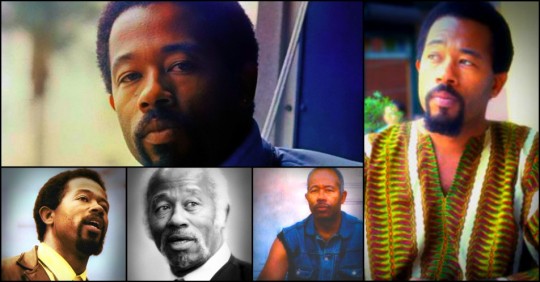
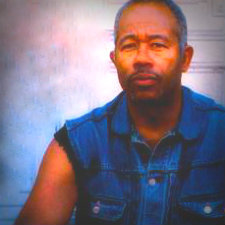
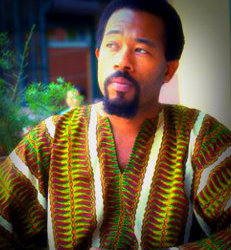



Leroy Eldridge Cleaver (August 31, 1935 – May 1, 1998) was an American writer and political activist who became an early leader of the Black Panther Party. His 1968 book, Soul On Ice, is a collection of essays that, at the time of its publication, was praised by The New York Times Book Review as "brilliant and revealing".
Cleaver went on to become a prominent member of the Black Panthers, having the titles Minister of Information and Head of the International Section of the Panthers, while a fugitive from the United States criminal justice system in Cuba and Algeria. As editor of the official Panther's newspaper, The Black Panther, Cleaver's influence on the direction of the Party was rivaled only by founders Huey P. Newton and Bobby Seale. Cleaver and Newton eventually fell out with each other, resulting in a split that weakened the party.
Cleaver wrote in Soul on Ice: "If a man like Malcolm X could change and repudiate racism, if I myself and other former Muslims can change, if young whites can change, then there is hope for America."
After spending seven years in exile in Cuba, Algeria, and France, Cleaver returned to the US in 1975, where he became involved in various religious groups (Unification Church and CARP) before finally becoming a Mormon and joining the LDS Church, as well as becoming a conservative Republican, appearing at Republican events.
Early life
Born in Wabbaseka, Arkansas, as a child, Cleaver moved with his family to Phoenix and then to Los Angeles. He was the son of Leroy Cleaver and Thelma Hattie Robinson. He had four siblings: Wilhelima Marie, Helen Grace, James Weldon, and Theophilus Henry.
As a teenager, he was involved in petty crime and spent time in youth detention centers. At the age of 18, he was convicted of a felony drug charge (marijuana, a felony at the time) and sent to the adult prison at Soledad. In 1958, he was convicted of rape and assault with intent to murder and eventually served time in Folsom and San Quentin prisons. While in prison, he was given a copy of the Communist Manifesto. Cleaver petitioned for habeas corpus to the Solano County Court and was granted it along with a release of a $50,000 bail.
Black Panther Party
Eldridge Cleaver was released from prison on December 12, 1966. He was writing for Ramparts magazine and organizing efforts to revitalize the Organization of Afro-American Unity. At this time, President John F. Kennedy and Malcolm X were dead. The Black Panther Party was only two months old. He then joined the Oakland-based Black Panther Party, serving as Minister of Information, or spokesperson. What initially attracted Cleaver to the Panthers, as opposed to other prominent groups, was their commitment to armed struggle.
In 1967, Eldridge Cleaver, along with Marvin X, Ed Bullins, and Ethna Wyatt, formed the Black House political/cultural center in San Francisco. Amiri Baraka, Sonia Sanchez, Askia Toure, Sarah Webster Fabio, Art Ensemble of Chicago, Avotcja, Reginald Lockett, Emory Douglas, Samuel Napier, Bobby Hutton, Huey Newton, and Bobby Seale were Black House regulars. The same year, he married Kathleen Neal Cleaver (divorced 1987) with whom he would have son Ahmad Maceo Eldridge (b.1969, Algeria) and daughter Joju Younghi (b.July 31, 1970, North Korea).
Cleaver was a presidential candidate in 1968 on the ticket of the Peace and Freedom Party. Having been born on August 31, 1935, Cleaver would not have been the requisite 35 years of age until more than a year after Inauguration Day 1969. (Although the Constitution requires that the President be 35 years of age, it does not specify if he must have reached that age at the time of nomination, or election, or inauguration.) Courts in both Hawaii and New York held that he could be excluded from the ballot because he could not possibly meet the Constitutional criteria. Cleaver and his running mate Judith Mage received 36,571 votes (0.05%).
Also in 1968, Cleaver led an ambush of Oakland police officers, during which two officers were wounded. In the aftermath of the ambush, Cleaver was wounded and 17-year-old Black Panther member Bobby Hutton was killed. The eight Panthers who ambushed the police department had two objectives: to break Newton out of jail and to kill police officers. In 1980, he claimed that he had led the Panther group on a deliberate ambush of the police officers, thus provoking the shootout. The same author who broke the news of this claim doubted its veracity, because it was in the context of an uncharacteristic speech, in which Cleaver also discredited the Black Panthers, stated "we need police as heroes," and said that he denounced civilian review boards of police shootings for the "bizarre" reason that "it is a rubber stamp for murder." The author speculates that it could have been a pay off to the Alameda County justice system, whose judge had only just days earlier let Eldridge Cleaver escape prison time; Cleaver was sentenced to mere community service after getting charged with three counts of assault against three Oakland cops. The PBS documentary A Huey Newton Story finds that “Bobby Hutton was shot more than twelve times after he had already surrendered and stripped down to his underwear to prove he was not armed.”
Charged with attempted murder, he jumped bail to flee to Cuba in late 1968. In Cuba, he received red-carpet treatment. Cleaver was set up in a Havana penthouse with his own personal maid and cook. The penthouse was stocked with all the food, rum, and cigars he would need. The hospitality soon ended. Having received information that the CIA had infiltrated the Black Panther Party, Castro could no longer trust them. Cleaver then decided to head to Algeria, sending word to his wife to meet him there. Cleaver had set up an international office for the Black Panthers in Algeria. Following Timothy Leary's Weather Underground-assisted prison escape, Leary stayed with Cleaver in Algeria; however, Cleaver placed Leary under "revolutionary arrest" as a counter-revolutionary for promoting drug use.
In 1969, Cleaver also cultivated an alliance with North Korea and BPP publications began reprinting excerpts from Kim Il Sung's writings. Although leftists of the time often looked to Cuba, China, and North Vietnam for inspiration, few had paid any attention to the secretive Pyongyang regime. Bypassing US travel restrictions on North Korea, Cleaver and other BPP members made two visits to the country in 1969-70 with the idea that the juche model could be adapted to the revolutionary liberation of African-Americans. Taken on an official tour of North Korea, Cleaver expressed admiration at "the DPRK's stable, crime-free society which provided guaranteed food, employment, and housing for all, and which had no economic or social inequalities."
Byron Vaughn Booth (former Panther Deputy Minister of Defense) claimed that, after a trip to the DPRK, Cleaver discovered his wife had been having an affair with Clinton Robert Smith Jr.. Booth told the FBI he had witnessed Cleaver shoot and kill Smith with an AK47.
In his 1978 book Soul on Fire, Cleaver made several claims regarding his exile in Algeria, including that he was supported by regular stipends from the government of North Vietnam, which the United States was then bombing. Cleaver stated that he was followed by other former criminals turned revolutionaries, many of whom (including Booth and Smith) hijacked planes to get to Algeria.
Split and new directions
Eldridge Cleaver and Huey Newton eventually fell out with each other over the necessity of armed struggle as a response to COINTELPRO and other actions by the government against the Black Panthers and other radical groups. Also Cleaver's interest in North Korea and global anti-imperialist struggle drew ire from other BPP members who felt that he was neglecting the needs of African-Americans at home in the US. Following his expulsion from the Black Panthers in 1971, the group's ties with North Korea were quickly forgotten. Cleaver advocated the escalation of armed resistance into urban guerilla warfare, while Newton suggested the best way to respond was to put down the gun, which he felt alienated the Panthers from the rest of the black community, and focus on more pragmatic reformist activity by lobbying for increased social programs to aid African-American communities and anti-discrimination laws. Cleaver accused Newton of being an Uncle Tom for choosing to cooperate with white interests rather than overthrow them.
Cleaver left Algeria in 1972, moving to Paris, France, becoming a born again Christian during time in isolation living underground. He turned his hand to fashion design, three years later releasing his codpiece revival "virility pants" he called "the Cleavers", enthusing that they would give men "a chance to assert their masculinity".
Cleaver returned to the United States in 1977 to face the unresolved attempted murder charge. By September 1978, on bail as those proceedings dragged on, he had incorporated Eldridge Cleaver Ltd, running a factory and West Hollywood shop exploiting his "Cleavers", which he claimed liberated men from "penis binding". He saw no conflict with his newfound Christianity, drawing support for his overtly sexual design from 22 Deuteronomy. The long outstanding charge was subsequently resolved on a plea bargain reducing it to assault. A sentence of 1,200 hours' community service was imposed.
Later life
In the early 1980s, Cleaver became disillusioned with what he saw as the commercial nature of evangelical Christianity and examined alternatives, including Sun Myung Moon's campus ministry organization CARP, and Mormonism. He later led a short-lived revivalist ministry called Eldridge Cleaver Crusades, "a hybrid synthesis of Islam and Christianity he called 'Christlam'", along with an auxiliary called the Guardians of the Sperm.
Cleaver was then later baptized into The Church of Jesus Christ of Latter-day Saints (LDS Church) on December 11, 1983, periodically attended regular services, lectured by invitation at LDS gatherings, and was a member of the church in good standing at the time of his death in 1998.
By the 1980s, Cleaver had become a conservative Republican. He appeared at various Republican events and spoke at a California Republican State Central Committee meeting regarding his political transformation. In 1984, he ran for election to the Berkeley City Council but lost. Undaunted, he promoted his candidacy in the Republican Party primary for the 1986 Senate race but was again defeated. The next year, his 20-year marriage to Kathleen Neal Cleaver came to an end.
In 1988, Cleaver was placed on probation for burglary and was briefly jailed later in the year after testing positive for cocaine. He entered drug rehabilitation for a stated crack cocaine addiction two years later, but was arrested for possession by Oakland and Berkeley Police in 1992 and 1994. Shortly after his final arrest, he moved to Southern California, falling into poor health.
Death
Cleaver died at Pomona Valley Hospital Medical Center in Pomona, California, on May 1, 1998, at 6:20 am. His family asked that the hospital not reveal the cause of death, although he was known to have diabetes and prostate cancer. He is buried at Mountain View Cemetery in Altadena, California.
Soul on Ice (1968)
While in prison, he wrote a number of philosophical and political essays, first published in Ramparts magazine and then in book form as Soul on Ice. In the essays, Cleaver traces his own development from a "supermasculine menial" to a radical black liberationist, and his essays became highly influential in the black power movement.
In the most controversial part of the book, Cleaver acknowledges committing acts of rape, stating that he initially raped black women in the ghetto "for practice" and then embarked on the serial rape of white women. He described these crimes as politically inspired, motivated by a genuine conviction that the rape of white women was "an insurrectionary act". When he began writing Soul on Ice, he unequivocally renounced rape and all his previous reasoning about it.
The essays in Soul on Ice are divided into four thematic sections: "Letters from Prison", describing Cleaver's experiences with and thoughts on crime and prisons; "Blood of the Beast", discussing race relations and promoting black liberation ideology; "Prelude to Love – Three Letters", love letters written to Cleaver's attorney, Beverly Axelrod; and "White Woman, Black Man", on gender relations, black masculinity, and sexuality.
Wikipedia
7 notes
·
View notes